- Baltic Equities
- Cryptocurrencies
- Outta bubble
- Personal Growth
- Social Conditioning
- Best of Internet
- Musical Inspiration
- Short Quotes
- Professional Photography
- Alternative Artistic Mastery
- Tolerable Shots
- About Generalist
- Got a question?

Recent Posts
- Reviewing Lesser Known Movies (Part 2)
- Annual Portfolio Overview & Market Outlook for 2024
- Reviewing Lesser Known Movies (Part 1)
- Thieve in the Wire
- Essentials for Alta Via 2: A 9-Day Hike Guide In Italian Dolomites
Stay in touch
Email address:
Prefer Twitter?
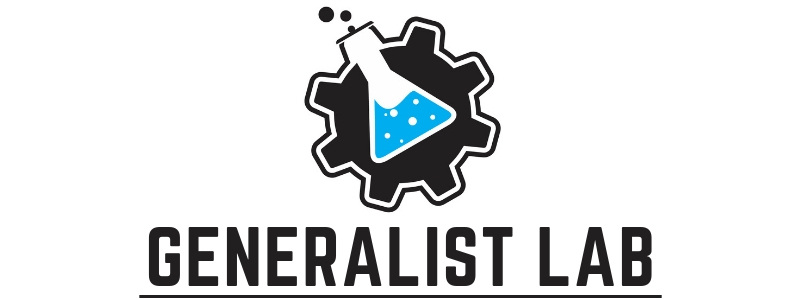
Kazakhstan’s SuperApp: Kaspi.kz
Similarly to Reliance Industries write-up , I’ll try to abstain myself from going too deep. I think what Kaspi.kz is today is a testament of superb execution by management and continuous entrenchment of moat.
I want to thank Better Nest for compiling a list of material on kaspi.kz , if your interest throughout the post is maintained I suggest you go there to learn more. Today my goal is to:
- brush over what Kaspi.kz is;
- shareholders with focus on CEO profile;
- key business aspects;
- valuation (no DCF needed, ratios and growth rates will suffice);
- potential upsides;
- risks and climate post Kazakh crisis;
- technical details: instrument, position, disclaimer;
- recommended further reading.
In Short: What is Kaspi.kz?
Businessman Vyacheaslav Kim co-founded and ran Electronics Network of stores in 1993. Enterprenuers at the time were buying banks, so in 2002 he bought one too: Bank Kaspiyskiy. Logic behind it being to provide leases for electronics buyers.
In parallel Mikheil Lomtadze, current CEO, was growing his competencies all around and landed a job and finally a partnership at investment fund Baring Vostok. Kim wanting to transform Kaspiyskiy sought expertise and capital. Two guys connected well, shook hands, exchanged Kaspi ownership, and decided to pivot traditional bank to a technology company , shifting focus from business customers to retail clients. Lomtadze joined company in 2007, which marks the transformation of the bank. In 2008 name was changed to Kaspi bank.

Kaspi.kz Today
CEO Mikheil Lomtadze likes to refer to Kaspi.kz as customer relations technology company , which puts emphasis on customer satisfaction (famous Bezos attribute) – key aspect of a successful B2C company. However, for investors, the notion of SuperApp is probably more clear. Tenscent’s Wechat started with chat, Kaspi.kz started with a customer finance app and grew from there.
Today Kaspi.kz has 3 main business lines (Payments, Marketplace and transformed legacy – fintech), but more importantly – has become a de facto leader in Kazakhstan’s digital transformation . As of 2021 Q3 57% of Kazakhs use the app monthly (+27% YoY growth), of which 60% are daily users:
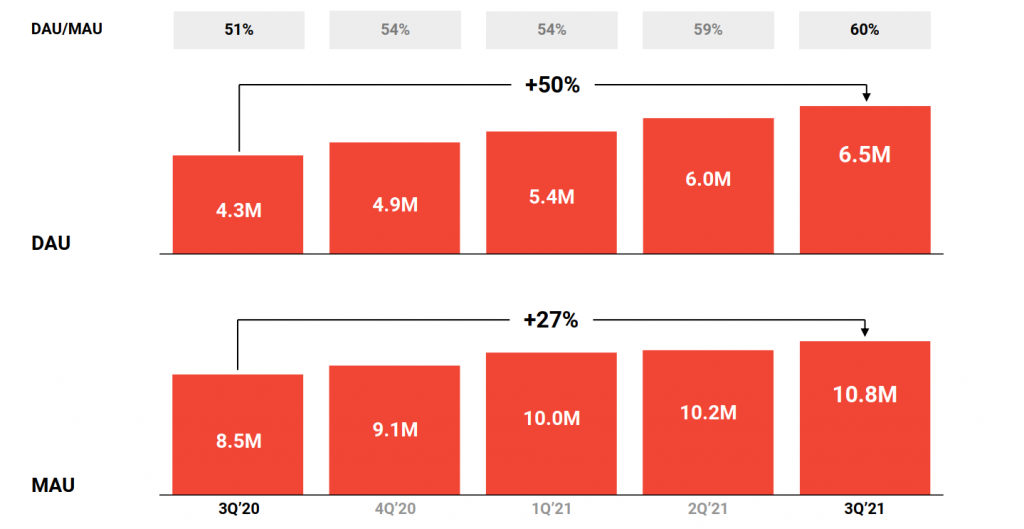
Shareholders
2021 Q3 report currently gives the latest data into Kaspi.kz ownership:

However, in 2020 audited annual report , Goldman Sachs ears are poking out too:

Another notable investor – Ark Funds also has a 18M stake at the time of writing:

I’ll return to this section when we talk about risks, but foreign institutional participation is welcome.
CEO Profile: Mikheil Lomtadze
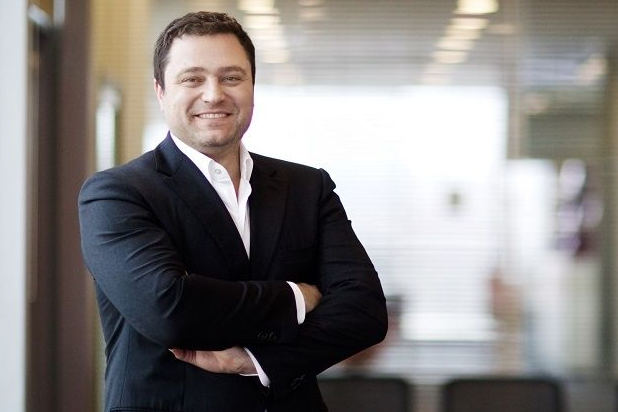
Mikheil is originally Georgian. Came from a difficult background and was pushed hard by his parents. Education came before entertainment in the household, so he was always busy.
Discovered his talent for sales and networking early while selling fish with his father.
In school, he questioned authority, got into fights (you see the build, right?), and eventually learned that nothing is impossible, through perseverance.
He graduated from Georgia’s European School of Management and MBA from Harvard Business School later on.
In interviews, two aspects always show up:
- emphasis on people you surround your self with (duh);
- intelectual humility .
I can’t say I know the people of the region. I’ve only been to Georgia once. But I would argue, central Asia should share at least some similarities with CEE region. People are direct. Either honesty or dishonesty shines through, unlike someone French.
All Mikheil’s significant wealth is in Kaspi.kz and he sees other personal investments as a distraction . I shared another nugget from the interview recently:
$KSPI CEO Mikheil Lomtadze's one of core beliefs: "being unsatisfied is the most important feeling you can have. Being unsatisfied means you go to work today and you are not satisfied with the things you did yesterday and you always look for the things to improve" — Generalist Lab (@Generalist_Lab) January 20, 2022
His competitive make-or-break mentality , I believe is an engine behind Kaspi’s execution success so far. He’s currently 46 years old and I could not hear any hint of him stepping down.
In his early career, Mikheil recalls “we were a bank, but people still hated us” (not a direct quote). His aspiration has always been to create a product, that people love and from a certain time NPS (net promoter score) became one of KPIs .
People working in Kaspi.kz
Kaspi has an employee ranking system. If you rank at the bottom three times in a row – you are fired. I haven’t read any glassdoor like reviews from former employees and I may disagree with the policy, but numbers are cranking so the system must be working.
As per 2020 audited report, there were 9000+ employees, 1200 of which in data science, IT and product development. Average employment term: 4 years ( average age: 30 )
Two notes here:
- modern fintechs have a problem with UX. Problem? You are frusted talking to a bot and waiting for a human. I suspect significant amount of cheaper (in comparison to west) local workforce is customer support.
- Most senior management members are old-timers from Vostok – Kaspi transformation times.
Kaspi’s Business Model
As mentioned above, Kaspi.kz classifies it’s business in three major lines within the same app, so let’s touch on each of them.
Kaspi.kz took Kazakhstan’s cash-rich ecosystem by storm. From 2020 report, kicking Visa and Mastercard in the teeth:
Kaspi.kz Payments Platform is the largest driving force behind Kazakhstan’s transformation from cash to cashless and digital transactions. Based on NBK data, our TPV corresponded to a market share of 69% in 2020 for total cashless and digital transactions (card payments, P2P payments, internet and mobile payments) effected in Kazakhstan, up from 65% in 2019

Payments functionality is the most important factor to acquire new customers into Kaspi.kz ecosystem. As you can see, there’s also a wide range of government-related services. One webinar on youtube also suggested there could be voting (as much as it matters in KZ) through the app. But more on government – later.
Merchants naturally have a lower base and show significant growth over consumers. From 2021 Q3 earnings deck :

Payments and marketplace businesses are gaining share in overall revenue 50% up from 34% a year ago:
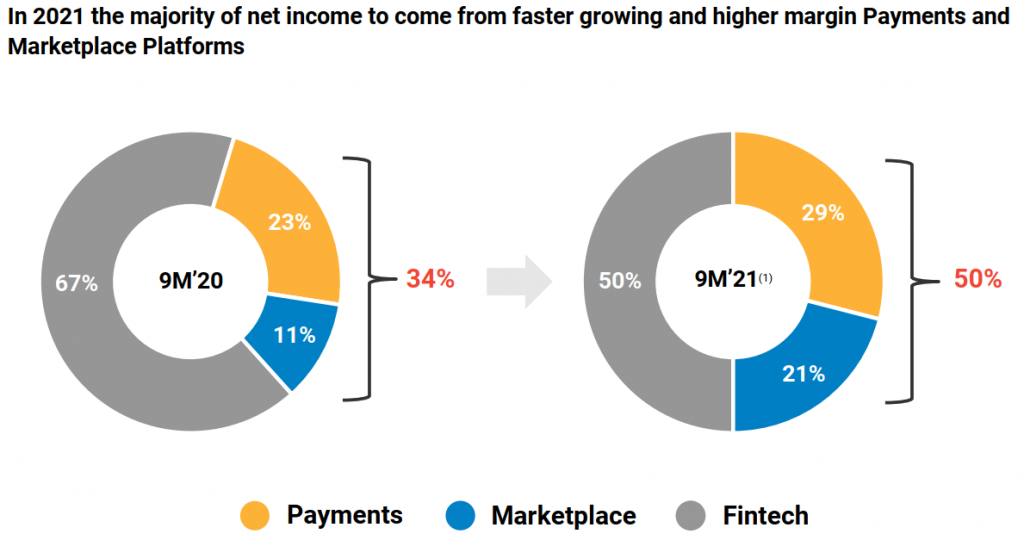
Speaking of margin… It’s a thing of beauty. For 2021 9M net profit margin was 60.9% and has increased almost +1800 bps from 2019. Network effects at play. More merchants – higher RTPV (revenue generating total payment volume) with a marginal incremental cost:
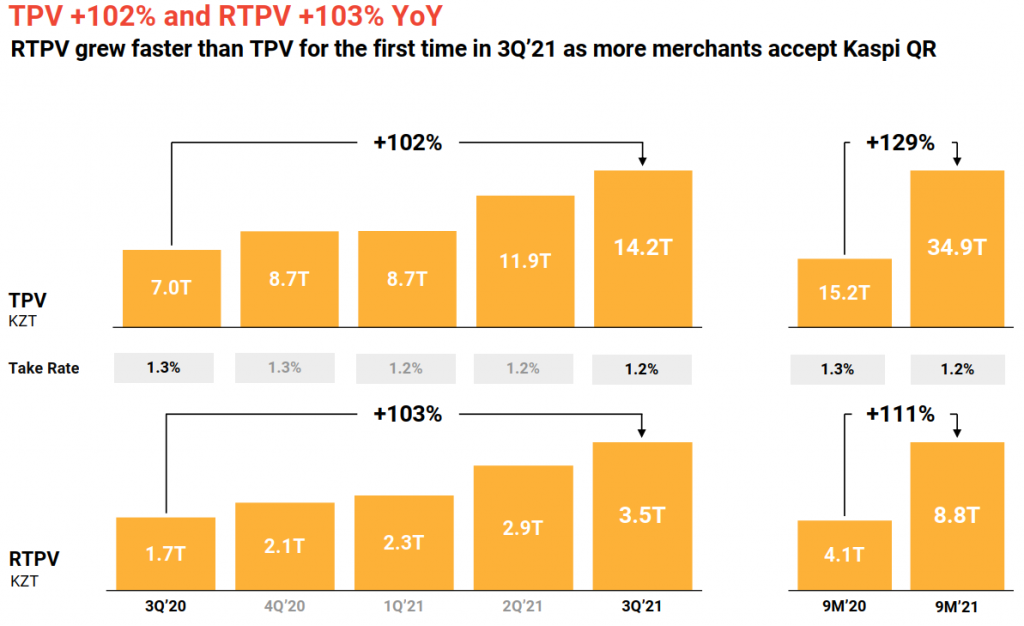
Marketplace
Within the same app a “Amazon” opens up. Difference is: there’s no first party. Kaspi.kz stays lean and only mediates between merchants and customers.

And it’s growing tremendously well too.
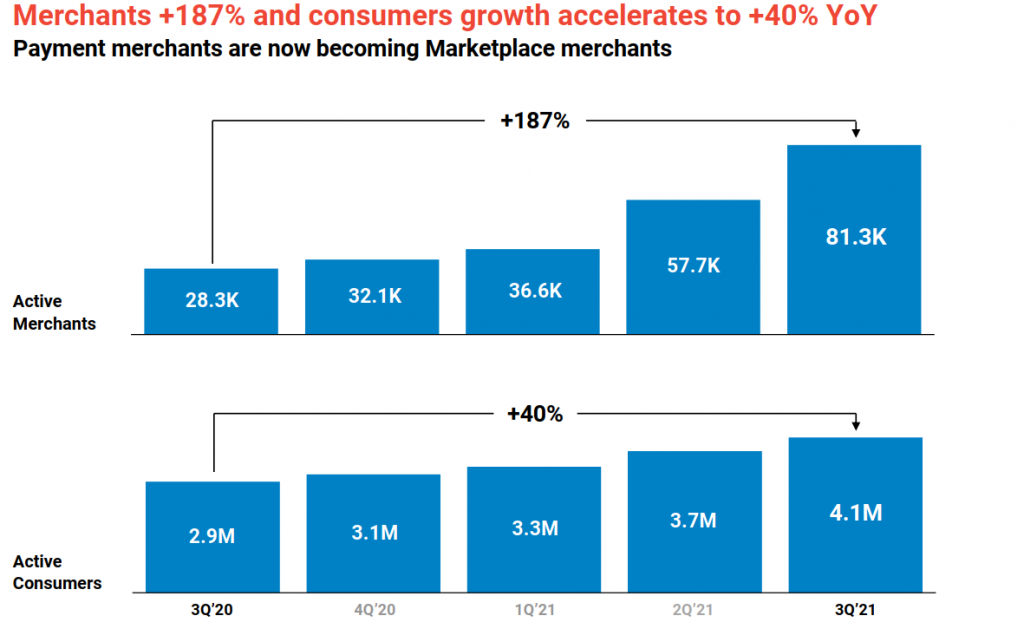
New merchants bring new merchandise, which grows consumer selection, deepening the moat in e-commerce, making Kaspi the default choice for consumers. The flywheel dynamics are the same across all marketplaces, so nothing new here. And Kaspi is a dominant player in a country.
GMV growth YoY exceeds doubling. Take rate is also expanding due to higher-margin categories.
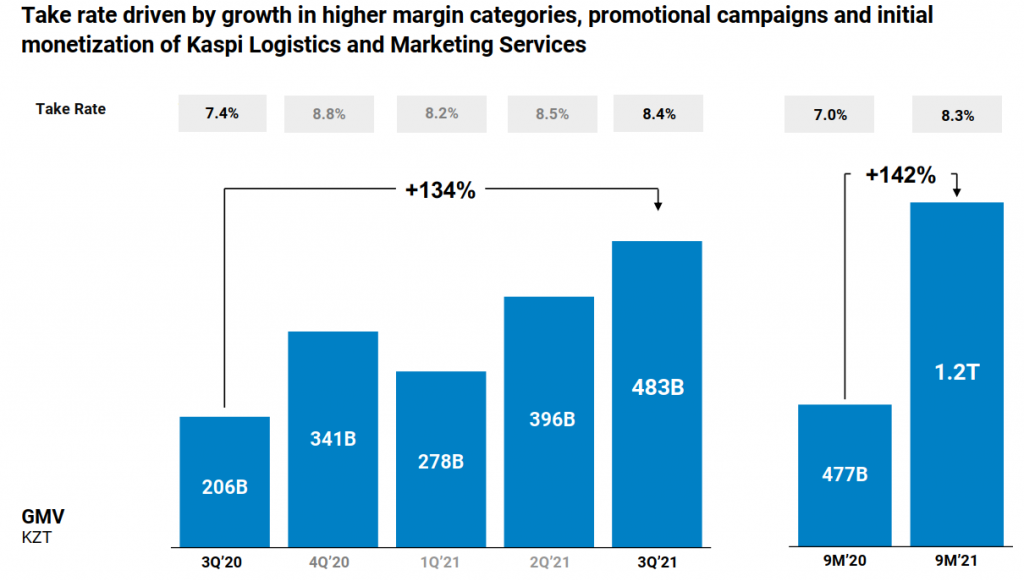
In an interview, CEO spoke, that logistics is something Kaspi is seeking partnerships with (Keeping it asset / CAPEX light). Currently majority of purchases for consumers are free shipping and delivered within 2 days (not to forget KZ is 9th largest country in the world).
I suspect Kaspi has given enough aggregated business volume for shipping carriers, that carriers are the ones in fact subsidizing free shipping. And Kaspi owns logistics software (from what I understand).
Net profit margin is even greater for Marketplace and as of 2021 Q3 was 66.4% (having expanded 400 bps from 2019).
That’s the legacy banking, on top of app, with sprinkles of modern BNPL for consumers. All things lending.

In 2020 Kaspi was leader in consumer loans with 32% market share and second in terms of retail deposits (18% share).
As all (I suppose) modern lending – Kaspi.kz utilizes all of the data it has on user, additionally, it has access to external data sources : LLC First Credit Bureau and JSC State Credit Bureau and Pension Centre.
With time, more data -> better risk profiling -> higher profitability. Classical machine learning in action. However notably models have been hit off-track in 2020 Covid.

Total value of loans (TFV) provided via app is on a steady growth:
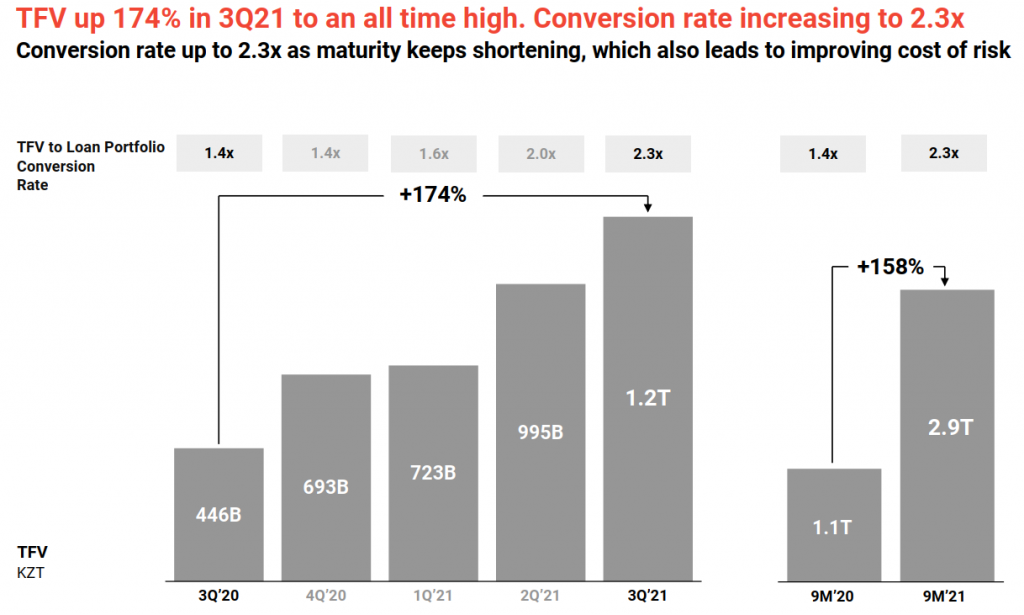
Fintech segment net profit margin for 2021 9M was also solid: 38.8% . Expanding more modestly 500 bps since 2019.
Consolidated Kaspi.kz Fundamentals
Here’s how segments have been performing lately:

Here are consolidated financials for 2019-2021 years with Net profit for 2021 taken from revised to the upside 2021 Q3 guidance for full year.

Last reported quarter, revenue grew +55% YoY, net income +90%…
Similar to Reliance story, Marketplace and Payments are the new drivers for the company and reacceleration in growth.
Consolidated margins are a testament of network effects and economies of scale again, for both of these new growth drivers. Not only it’s a startup with moat, it’s a high cash conversion, profitable startup .
At 85.75 USD of GDR at the time of writing, this company trades at 16.1 forward (guided) P/E .
Assuming 534 Million KZT in EBIT and 2021 Q3 balance sheet EV/EBIT is at 13.4 .
Want a fun excercise? Let’s see how these look on 2021 9 months income:
- 19.2 EV/EBIT
Not too shabby either for solid growth and margin expanding profile.
…and it pays dividends… From IPO prospectus:
The Company intends to pay dividends annually in the amount of at least 50% of net income, calculated under International Financial Reporting Standards (“IFRS”)
On 445 Bn KZT, at current price, we are looking at 3.1% dividend yield .
Upside Potential
Layering, cross-selling and arpu growth.
There’s this story floating around: Kaspi bought a local ticket company, integrated it into it’s SuperApp and saw a growth way above, what it was growing on it’s own. That’s a real proof of SuperApp accessibility doing its magic. One are for growth is just developing and layering additional services and products .
Maintaining new services adds little to costs, but may contribute significantly to bottom line.
Cross-sell is another. As of 2021 Q3 only 40% of customers use all three platforms. Of course you won’t make everyone take out loans, but I saw Payments MAU < Total MAU’s, which is way easier jump. On-boarding to marketplace is also win-win.

ARPU Growth is another area. Each landed customer is likely to spend more over time as he gets used to shopping/ paying online through the App. Cohort data for both RTPV and GMV look alike:
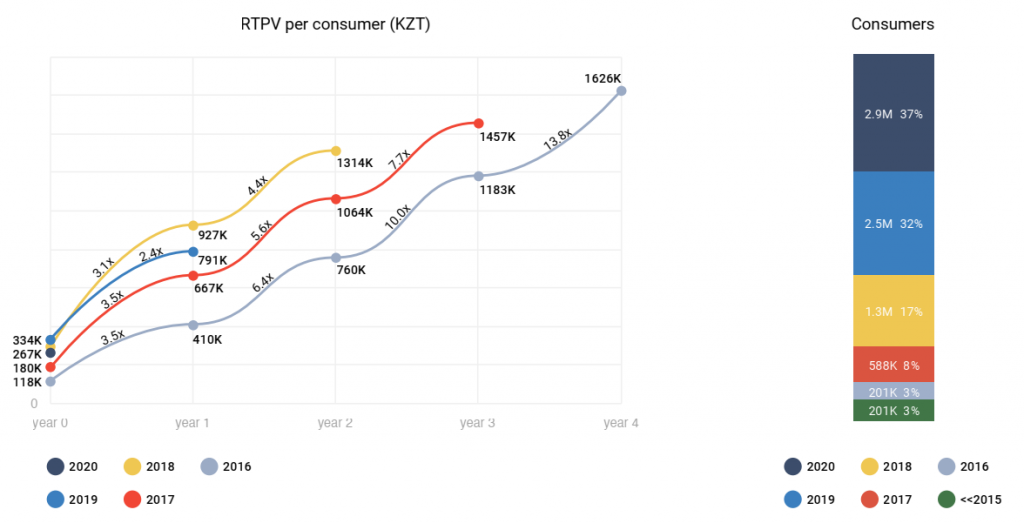
ARPU growth is somewhat automatic. All Kaspi has to do is maintain high level of customer service.
Saturating Kazakhstan Market
Kazakhstan population is 19M. Kaspi monthly actives crossed half population last year. Notably, DAU/MAU is second best after WeChat among SuperApps.
70.2% of Kazakh population falls under 15–64 years, so I would assume a realistically reachable population is around 14 – 14.5M . (2021 Q3 MAU: 10.8M), which is another 30%+ growth. Not to forget network effects in place compounding profits.
Either way, management already sees the ceiling in home market and speaks of international efforts more often lately.
International Expansion
Online business model makes it way easier to travel across borders. Central Asian region still very much cash-based, but other neighboring markets have tighter competition (my impression on learning about the company). Another regional quality – low e-Commerce penetration and low consumer leverage.
Kaspi is already active in Azerbaijan (population: 10M). In 2019 it acquired real estate and auto classified companies. In 2020 report company notes:
In Azerbaijan our three leading classified platforms have continued to scale their users, revenue and profitability since being acquired by Kaspi.kz in 2019
Another notable thing, is regional marketplace , opening opportunity for merchants to grow their business in outside markets.
In October Kaspi announced it completed the acquisition of a Ukrainian bank. Basically, it’s a banking license purchase. Ukrain population: 44M.
Kaspi.kz has a real shot to become a regional SuperApp for Central Asia markets .
It’s fair to say, Kaspi stock has a regional discount attached to it. No US company with comparable growth rates and profitability could be sold at 17 P/E. This obviously comes with risks.
Adverse Anti-Monopoly Policy
Kazakhstan is democracy on paper, authoritarian in nature. If upper management is friends with government players, I would assume Kaspi is protected. There are even four reasons I think government is unlikely to come after Kaspi:
- Kim Vyacheslav is known to have relations inside government. At one point he served as an advisor to the prime minister;
- My general impression from reading Facebook comments: people love the app, I would assume are even proud of it’s home-grown roots. Government attacking private company would look bad in the eyes of the public (as much as gov. cares, of course);
- It is is gov’s interest to encourage the use of online payments. This lowers shadow economy, gives more observability.
- President Tokayev met with Kaspi founders in 2021 Feb. Gov. services availability through the Kaspi.kz app is an indication of public – private relationship with current leadership.
Taxation is however another discussion. Similar to Evolution , I would argue certain aspects of business could be squeezed harder.
Shareholder Shakeout
There’s a shady entry – exit story of former president Nazarbayev nephew Satybaldy, who supposedly sold this stake before London IPO in 2020 October. There could be a number of informal or undisclosed shareholder agreements between three major parties owning Kaspi.
Co-founders were not willing to share specifics to Forbes on the issue, which sheds some negative light on the subject.
Baring Vostok Exit
Baring Vostok Fund has been an early investor in Yandex (Russian tech giant) and eventually sold their stake. Recent filings show their position decline. This may put sustained pressure on share price if their strategy is eventually exit via public market.
Departure o major institutional shareholder would also be seen as a negative in some investors’ eyes for sure.
Failure to Expand Interntionally
In light of recent headlines on Ukraine it may sound crazy, but I’m trying to get into management’s heads and think through. Worst case: Russia indeed invades and takes over Ukraine, when dust settles, it’s still unlikely Russia would kick its’ ally’s business out of a market. But it would be painful period of uncertainty for sure.
As mentioned above, I did not dive into any specific countries for potential payment or ecommerce fintechs, but my general understanding is other countries will pose greater competitive pressures. Execution and timing are key.
Kazakhstand’s Political Stability
Few days ago I shared an article by Armenian Weekly . This and other readings on 2022 January deadly protests formed my understanding of situation:
Nazarbayev officially stepped down in 2019, but remained a shadow control figure and actual chairman of KZ’s Security Council until 2022 January. People hate the guy and for the longest time assumed second president since independence Kassym-Jomart Tokayev to be a Nazarbayev’s puppet. However January’s events hints, that Tokayev is gaining or gained autonomy. Putin seems to respect KZ boundaries as well and sustained Russian troops presence would have gained negative sentiment among KZ population (Russia as former oppressor).
What seem to have happened in January is an opportunistic gang clash for power .
Regionally everyone wants stability in KZ. Especially Kazakhs. To my own surprise Kazakhstan’s Tenge (local currency) has floated quite beautifully through the crisis. Strong export economy may be the reason:
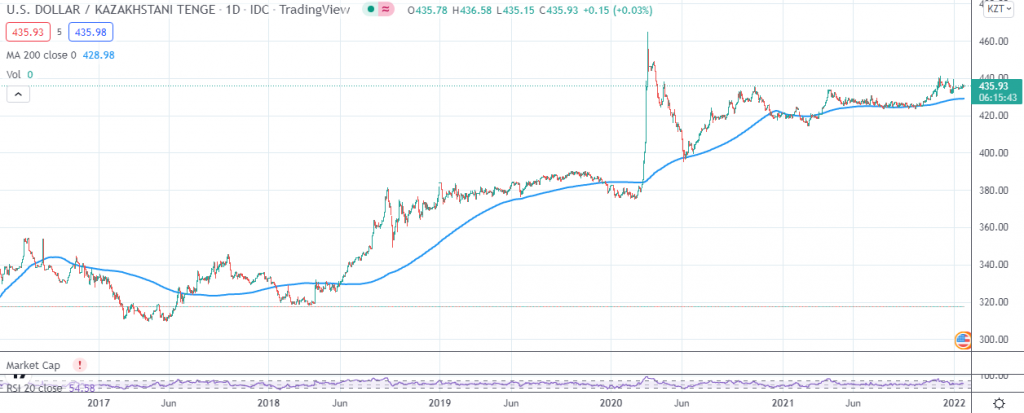
A real risk one has to be aware of is exposure to business, that primarily conducts its affairs in KZT. Tenge has been devalued in the past .
2022 Q1 Numbers
Positive in a negative light. Kazakhstan has shut down internet for nearly a week during clashes in January. I could not download Kaspi’s filings from investor relations. You might expect a dip in 2022 Q1 numbers, however short the disruption. But according to this post from CEO on Facebook :

The government assisted Kaspi in providing its essential services. Also note worthy, 3 point in the same post remarks on the damage done during revolt on headquarters (?).
Position Details
Easiest way to access Kaspi.kz stock is through London GDR’s (1 GDR = 1 stock). ISIN code: US48581R2058. Link on LSE.
Last year my curiously was flirting with Russian stocks for their relative valuation and quite diverse selection. Kaspi.kz is a middle, that satisfies a regional risk / reward profile I was seeking exposure to. Next week I’ll be initiating a position with a family member in a joint purchase. My portion of the position will amount to only 1% of portfolio. Consider it a starting – learning position.
Just a reminder to read my poorly written disclaimer .
Closing Words
Market is usually right. Companies growing 40% with expanding bottom line at 50% net margins don’t trade at 17 P/E. Although Kaspi had nearly a green-field opportunity, making its way into new markets will likely be a lot more pushing elbows, however currency devaluation is primary risk in my opinion.
Kaspi has build from the ground up what western companies like Facebook ( f|_|ck you meta ) only now aspire to do – a SuperApp, that consumers use daily for payments, shopping and other financial or government services. This is a very strong business with modern SaaS buzzwords like network effects and economies of scale actually showing up in financial statements.
CEO is a clear leader. Self-made billionaire from Georgia is humble and always unsatisfied, which drives innovation.
If company maintains its execution, as market trust builds, there’s a reasonable chance for multiple expansion. There’s also a fair shot Kaspi.kz becomes Central Asian SuperApp.
Recommended Material List
To continue learning about the company, this is a non-exhaustive list of material I found most useful:
- Video Interview with CEO
- Writeup by Asaf Rentsler
- Lecture by Mikheil Lomtadze
- Forbes on slim shady shareholder
- Invetor Relations , of course
- Another Generalist writing on Kaspi
- Another CEO interview for PwC
- Podcast on Kaspi with Thomas Bachrach (and other things)
You might also like

Leave A Reply
Leave a reply cancel reply.
Your email address will not be published. Required fields are marked *
Save my name, email, and website in this browser for the next time I comment.
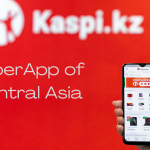
The Two Billion Dollar Mystery Behind The Ownership Of London-Listed Kazakh Fintech Kaspi
- Share to Facebook
- Share to Twitter
- Share to Linkedin
Kaspi CEO Mikhail Lomtadze (L), chairman Vyacheslav Kim (R)
Last month, Kaspi.kv, the retail and fintech unicorn from Kazakhstan, made headlines around the world after a successful IPO on the London Stock Exchange at a $6 billion dollar valuation. It was celebrated as the largest international tech IPO in London of 2020.
But Kaspi is not a traditional tech startup with hungry, disruptive founders and hard driving investors. At the heart of Kaspi is a deal among three men and a private equity fund involving billions of dollars that–despite scrutiny from the London Stock Exchange, sponsors and regulators–raises a whole host of questions.
The two most important players at Kaspi are its chairman, Vyacheslav Kim, and CEO Mikhail Lomtadze, whose respective 25% and 23% stakes are currently worth around $2 billion each. But, working alongside Moscow-based private equity fund Baring Vostok, the journey the duo took to become the largest individual shareholders of the company is filled with plot holes.
The largest of which features one Kairat Satybaldy, a former investor and the politically powerful nephew of Kazakhstan’s former president Nursultan Nazarbayev. Satybaldy claims to have walked away from Kaspi in 2018, unloading a very similar sized stake to the one now owned by Lomtadze.
In what’s described by a Kaspi spokesperson as part of a “large transaction,” Kim spent around $390 million buying Kaspi stock in 2018. Then, according to the prospectus, he transferred shares to Lomtadze that at the time were worth an estimated $500 million, in exchange for a “certain non-cash consideration” in December 2018 “pursuant to a long-standing arrangement encompassing their various business interests.”
Added to a 9.9% stake given to Lomtadze by Kim (as part of the same “arrangement”) prior to 2017–Lomtadze was granted a total stake of 31% in Kaspi.
In 2019, Lomtadze’s ownership dropped to 29%; it appears as though he may have sold part of his holding to Goldman Sachs, which acquired a 4% slice of the company that year. Lomtadze now owns 23% of the company, according to filings, worth $2.2 billion.
CEO Mikhail Lomtadze of Kaspi
In a statement to Forbes , a Kaspi spokesperson confirmed the deal, which was made between Lomtadze and Kim in 2007, but said, “It’s not correct to say that Mikhail was just given his stake.” Lomtadze “built” Kaspi, the spokesman says, adding that “it’s quite common for entrepreneurial founders to own large equity stakes in their businesses.” But Lomtadze is not a founder. He arrived at the bank that would become Kaspi as its CEO following an investment in the bank by Baring Vostok, where Lomtadze was a partner.
The spokesman for Kaspi did not explain how Kim came up with hundreds of millions of dollars to buy Kaspi shares, nor on the exact terms of the 2007 deal that made Kim and Lomtadze equal partners. Kaspi said that it couldn’t comment on Kim’s “specific financial arrangements” but added that “[t]he increase in Mikhail [Lomtadze]’s stake is due to the formalization of his partnership agreement with Vyacheslav [Kim] and not related to his annual compensation.”
Kaspi confirms that it took around 13 years—from 2007 until this year–for Kim and Lomtadze to “formalize their shareholder agreement.” It also says that because the company didn’t seek external capital or pre-IPO funding, other than an investment from Baring Vostok in 2006, there was–until now–no need to make the “agreement” formal or public.
Addressing the uncertainty about why an agreement between the pair was not made formal until “the very last moment,” Lomtadze claims in an interview conducted by a partner at PWC and published Tuesday on forbes.kz ( Forbes Kazakhstan, an independent licensee of Forbes) that the two men’s relationship was one of “complete trust and chemistry.”
Kaspi Conquers Kazakhstan
Kaspi’s mobile payments and banking app is used by around half of Kazakhstan’s 18 million people—and in less than a decade, the company has helped begin weaning the country off using cash, claiming in September that daily active users of the app had increased 172% over the prior year. Kaspi says it now accounts for 68% of all electronic transactions in Kazakhstan, a payments footprint almost twice the size of all its competitors combined, including Visa and Mastercard. “People saw how easy it made their lives,” says Dr Atanu Rakshit, assistant professor of economics at Kazakhstan’s Nazarbayev University.
A person downloads the Kaspi application on their smartphone in Almaty
With close ties to Kazakhstan’s government, Kaspi has also emerged as the country’s unofficial national online bank for paying taxes and fines, assuming a role that would otherwise be filled by the civil service or a government department, and further driving new user growth across the country. It even helped distribute social benefits during the pandemic.
Revenues grew 32% to $740 million in the first half of 2020. Profits have jumped too, up 50% to $286 million, while payment transactions hit 718 million for the quarter ending September, Kaspi announced, up by 212% year-over-year, as their app quickly conquered the country during the pandemic.
Although Kaspi’s success in Kazakhstan is clear, what remains unclear is how Kaspi’s puzzling ownership changes passed muster with the powerful institutions scrutinizing Kaspi’s public listing, namely book runners Morgan Stanley, Citigroup and Renaissance Capital, the U.K.’s Financial Conduct Authority and the London Stock Exchange. The concerned parties all referred Forbes to investor relations at Kaspi.
Lomtadze, Kim And Kaspi
Kim, described in a Kaspi press release as a “mathematician and physicist by training, but an entrepreneur by calling,” found success in retail mainly through launching home electronics chain Planet Electronics, which he exited in the mid-2000’s, according to a Kaspi spokesperson, around the time Kaspi “became his principal investment.” Planet Electronics shut down in the late 2000s. Kim is also an investor and chairman of the supervisory board of supermarket group Magnum, described by a local news agency in April as the largest chain in Kazakhstan.
In 2002, Kim, who was 32 at the time, bought Kaspiyskiy—then a recently privatized bank—for an undisclosed sum. “It might have been a bit naive, but buying a bank was a big trend. Every successful entrepreneur was buying a bank, so we did too,” he was quoted as saying in a company statement in July 2019.
Lomtadze, who hails from neighboring Georgia, speaks English and is the public face of Kaspi. One of his country’s earliest free market fundamentalists, Lomtadze attended Georgia’s first ever business school before starting an auditing firm in 1995 and then hopping over the pond for Harvard Business School. He graduated in 2002, the same year he met Michael Calvey, the American founder of Baring Vostok, in New York. “I don't need any salary,” Lomtadze says he told Calvey at their first meeting, speaking to Forbes from Almaty in early November on a video call. “I just want to work with Baring Vostok.” Lomtadze subsequently joined Baring Vostok and became a partner in 2004.
In 2006, Baring Vostok, invested an undisclosed amount in Kaspisky (bank), leading Lomtadze to join forces with Kim in 2007. They rebranded Kaspisky as Kaspi the following year. The duo has since made at least five additional investments in Kazakh businesses, including companies in bill payments, car retail, and online classifieds. By June 2020, Kim held around 31% of Kaspi, while Lomtadze held 25.9%, according to an audited financial statement.
Kairat Satybaldy
The third man with an important connection to Kaspi is Kairat Satybaldy, the nephew of Kazakhstan’s former longtime president Nursultan Nazarbayev. Often described as the son Nazarbayev never had, Satybaldy is a leading figure in the ruling Nur Otan Party, and a member of the country’s business and political elite.
Kazakhstan's former President Nursultan Nazarbayev (L) and Russia's President Vladimir Putin shake hands
Satybaldy claims to have first acquired a stake in Kaspi in 2015, and then became one of the three largest three shareholders alongside Kim and Baring Vostok. According to Kaspi’s company accounts, Satybaldy owned 30% of the firm as of December 2017, while Kim owned 21% and Baring Vostok 38%.
Satybaldy then appeared to cash out prior to Kaspi’s failed 2019 London IPO attempt. This year’s Kaspi IPO prospectus shows that between July and September 2018, Satybaldy (spelled Satybaldyuly in the document) unloaded his entire shareholding in the company through a series of sales on the Kazakhstan Stock Exchange (KASE), and completed his exit on October 1, 2018. (The company was listed on the Kazakh stock exchange but had just four main shareholders.) The prospectus shows that this is the same period during which Kim bought and “transferred” nearly 39.9 million shares to Lomtadze.
Kate Mallinson, associate fellow at London-based policy institute Chatham House, says the movement of “one stake from one shareholder to another with little explanation suggests a typical Kazakh playbook [of] corporate behavior.” Adding, “If Satybaldy’s name had been on the ownership [this year], red flags would have alerted any financial institution interested in the listing. Behind the scenes, the extended Nazarbayev family own most of the banking sector and Kairat [Satybaldy] is one of the most influential economic actors.”
Despite stepping down as Kazakhstan’s president in 2019, Nazarbayev remains the single biggest source of political and economic power in the country, says Mallinson, describing Satybaldy as a “trusted nephew” of Nazarbayev and “one of the most powerful players behind the scenes in Kazakh elite politics.” In other words, Satybaldy is a politically exposed person and would have drawn scrutiny from regulators if he remained a controlling shareholder ahead of the IPO.
Kaspi headquarters in Almaty
Dosym Satpayev, a director of the Risk Assessment Group, an Almaty-based consultancy firm, says that the “point of view” among geopolitical analysts in Kazakhstan is that “the departure of Kairat Satybaldy from Kaspi Bank was formal and is precisely connected with the IPO, since the presence of Kairat Satybaldy among the bank's shareholders could negatively affect the bank's reputation during the IPO.”
Satpayev suggests, “Kairat Satybaldy transferred (or sold) his shares to other shareholders” and these shareholders “may” have “entered into a safe agreement with him that, as nominal owners of the asset, they will take into account his interests and return the shares upon demand to the true owner.” Satpayev suggests that Satybaldy could become a shareholder of Kaspi again, using an offshore entity to do so. Satybaldy could not be reached for comment. The Kazakhstan embassy in London described Satybaldy as a “private citizen” and referred Forbes to direct inquiries to Kaspi.
A Kaspi spokesperson tells Forbes that Satybaldy was a “financial investor with no direct involvement in the company” and has “no connection in any capacity with the company now.” Satybaldy was reported by a Kazakhstan news website in April 2019 as stating that his “investment strategy” is to “invest for three years on average” and he “fully exited from Kaspi.kz, selling my stake to the company and other shareholders” in 2018.
Kaspi has long maintained an open dialogue with top politicians in Kazakhstan and Kim once served as an advisor to the prime minister. “In emerging markets, everything is relationship-driven,” he said in 2019, speaking about Kaspi’s private-public position in a company statement. With such a connection to the political center in Kazakhstan, it remains possible that Satybaldy has not completely stepped away from Kaspi, although Kaspi refutes this allegation.

- Editorial Standards
- Reprints & Permissions
- Harvard Business School →
- Faculty & Research →
- October 2019
- HBS Case Collection
Kaspi.kz IPO
- Format: Print
- | Language: English
- | Pages: 28
About The Author
Victoria Ivashina
More from the authors.
- Faculty Research
Corporate Debt, Boom-Bust Cycles, and Financial Crises
- September 2023
Blackstone Credit and Delaware Basin Resources
Saham group: it's in the genes.
- Corporate Debt, Boom-Bust Cycles, and Financial Crises By: Victoria Ivashina, Sebnem Kalemli-Özcan, Luc Laeven and Karsten Müller
- Blackstone Credit and Delaware Basin Resources By: Victoria Ivashina and Alys Ferragamo
- Saham Group: It's In the Genes By: Christina R. Wing and Esel Çekin

Market Wonders with Michael Wang

Kaspi: Gateway to Digital Convenience in Central Asia (NASDAQ:KSPI)
The thriving kazakh superapp poised for regional dominance.

In the heart of Central Asia, Kaspi is redefining the financial landscape, emerging as a beacon of innovation and convenience. Born as a traditional bank in 2008, it transformed into a dynamic digital ecosystem, encompassing a thriving marketplace, a versatile payment platform, and a broader fintech solution. By seamlessly connecting consumers to a spectrum of ever-increasing services, Kaspi has established itself as a one-stop digital powerhouse, transforming how people live their lives and allowing its users a uniquely digital-first connected experience. This deep dive analysis delves into the intricacies of Kaspi's business model, explores its alluring facets and considerations, and presents what I believe is the most compelling investment case in the markets today.
Investor Relations | Earnings Report 3Q23 | Form F-1 Draft Prospectus
As a paid subscriber, you'll gain access to a proprietary operating and returns model that will empower you to tweak inputs and develop your own investment perspective. My mission is to engage with you and the whole community , question each other’s assumptions, learn and get smarter together so we can make strong and data-driven investment decisions and all achieve financial independence .
Kaspi's Evolutionary Journey
Kaspi's journey from its origins as a traditional bank to a leading digital SuperApp is a remarkable tale of evolution and foresight. Founded in Kazakhstan in 2002, it initially operated within the conventional banking framework. However, visionary leadership and a relentless focus on innovation saw Kaspi pivot dramatically following Mikheil Lomtadze becoming the CEO in 2007. By leveraging technology, Kaspi expanded beyond banking, offering a marketplace platform that revolutionized retail and e-commerce in the region. Adding payment solutions and fintech services transformed Kaspi into a holistic SuperApp, simplifying the financial and commercial needs of millions, all under one digital roof. This evolution wasn't just a change of services but a reimagining of consumer engagement, setting Kaspi apart as a vanguard of digital transformation in Central Asia. As of 3Q23, Kaspi has 13.5m Monthly Active Users (MAU) and an impressive 8.8m Daily Active Users (DAU) across Kazakhstan with its ~20m population.
Fintech, Payments, and Marketplace Flywheel
Kaspi offers a comprehensive range of services across three key segments which mutually reinforce each other in a virtuous flywheel:
I. Payments Segment :
Kaspi's payments segment has fundamentally transformed transaction methods in Kazakhstan. Its mobile wallet facilitates instant payments, transfers, bill payments, and mobile top-ups, integrating seamlessly into the daily lives of its users. The efficiency, security, and convenience it offers draw parallels to established fintech players like Block (NYSE:SQ).
Kaspi monetizes this segment by taking a fee on processed transaction volumes. With Kaspi Pay, the Company effectively circumvents traditional card networks and provides payment processing services akin to Adyen (albeit mostly to SMBs rather than enterprises; ADYEN.AS). This dual role allows Kaspi to capture value at multiple points in the transaction chain.
In 2019, Kaspi processed a modest 2% of Kazakhstan's transaction volumes, with the majority dominated by Visa and Mastercard. However, in a striking shift, Kaspi has now emerged as the leading payment provider in the country. Today, over 90% of in-store transactions made through Kaspi are processed using its Kaspi Pay acquiring service, underscoring its rapid ascendancy and the effectiveness of its strategy in overtaking traditional payment giants. This dramatic growth highlights Kaspi's deep market penetration and capability to revolutionize payment systems in a strikingly short time frame.
Key Metrics 2023E (see model for details) : 12.9m Active Users (94% of Group MAU), $63bn processed volume (44% YoY growth), 1.65% take rate (down from 1.67% in 2022A) —> $1.0bn Revenue (43% YoY growth) with $0.7bn Net Income (65% margin)
II. Marketplace Segment :
Kaspi's marketplace segment marks its strategic positioning in e-commerce, creating a dynamic platform for buyers and sellers. This segment, rapidly evolving to mirror the likes of Amazon (NASDAQ:AMZN), offers diverse products and services, streamlining online shopping experiences with remarkable ease and efficiency.
It broadens consumer choices and empowers local businesses by giving them a digital presence and access to a wider customer base. E-commerce is still in its early innings in Kazakhstan, with current penetration of only 10.7% and expected to reach 20%+ by 2027E. Initially focused on electronics, the platform has successfully branched into various other SKU categories (from 2.4m in 3Q22 to 4.5m in 3Q23). This expansion is a strategic move that has significantly driven up the take rate – from 6.0% in 2018 to an estimated 10.3% in 2023E. This increase in the take rate is a clear indicator of the platform's growing appeal and efficiency in the e-commerce space. Comparatively, Mercado Libre has a take rate of ~14%, suggesting that there is still meaningful room for Kaspi to grow and increase its take rate further in the coming years.
Additionally, Kaspi's marketplace segment has significantly enhanced convenience for its customers by introducing Postomats (akin to InPost; INPST.AS). These automated parcel delivery terminals allow for easy, secure, and swift collection of online purchases, further streamlining the e-commerce experience - there are currently 5.2k terminals through which customers pick up 37% of all e-commerce orders.
Key Metrics 2023E (see model for details) : 7.0m Active Users (51% of Group MAU), $9bn GMV (46% YoY growth), 10.2% take rate (up from 8.4% in 2022A) —> $0.9bn Revenue (78% YoY growth) with $0.6bn Net Income (61% margin)
III. Fintech Segment :
Kaspi's fintech segment stands at the forefront of its offerings, providing innovative financial solutions. This segment includes a diverse range of banking services, loans, and credit products, such as a buy-now-pay-later (BNPL) option, all seamlessly accessible through its digital platform. This arm of Kaspi is akin to the fintech services offered by companies like Block/AfterPay (NYSE:SQ) or Affirm (NASDAQ:AFRM), designed to simplify and enhance the personal finance management experience with its tech-driven approach.
Kaspi excels in its fintech metrics, primarily due to its effective risk management capabilities. The Company's extensive real-time data on customer lifestyles and transactions enables it to predict delinquencies accurately. This proficiency is reflected in a low and consistent delinquency rate of ~2%, with improving loss rate vintages. Even during unprecedented challenges like the Covid-19 pandemic, Kaspi managed to maintain stability without any significant disruptions or spikes in delinquencies. This resilience and handling of risks underscore Kaspi's strength in the fintech sector, offering customers a reliable and secure financial service platform.
Key Metrics 2023E (see model for details) : 6.1m Loan Customers (45% of Group MAU), $7.5bn Average Net Loan Portfolio (33% YoY growth), 34% yield (flat vs 34% in 2022A) —> $2.2bn Revenue (38% YoY growth) with $0.7bn Net Income (30% margin)
Indeed, all three segments are fast-growing and profitable. Kaspi’s strategy to ensure profitability in each segment from the outset was necessitated by its limited access to funding, eliminating the possibility of cash burn typically seen in growth-stage companies. This approach, born out of necessity, has become a deeply ingrained cultural element within the Company, guiding its business practices and shaping its sustainable growth model. In 2023E, I expect Kaspi to generate ~$4.2bn Revenues (47% YoY growth) and ~$1.9bn Net Income (42% YoY growth, 42% margin).
Each segment demonstrates Kaspi's commitment to leveraging technology for financial and commercial convenience, cementing its status as a SuperApp in the region. As shown below, Kaspi’s journey from a pure-play fintech provider towards a holistic SuperApp stands out when looking at Revenue and Net Income breakdown by segment.
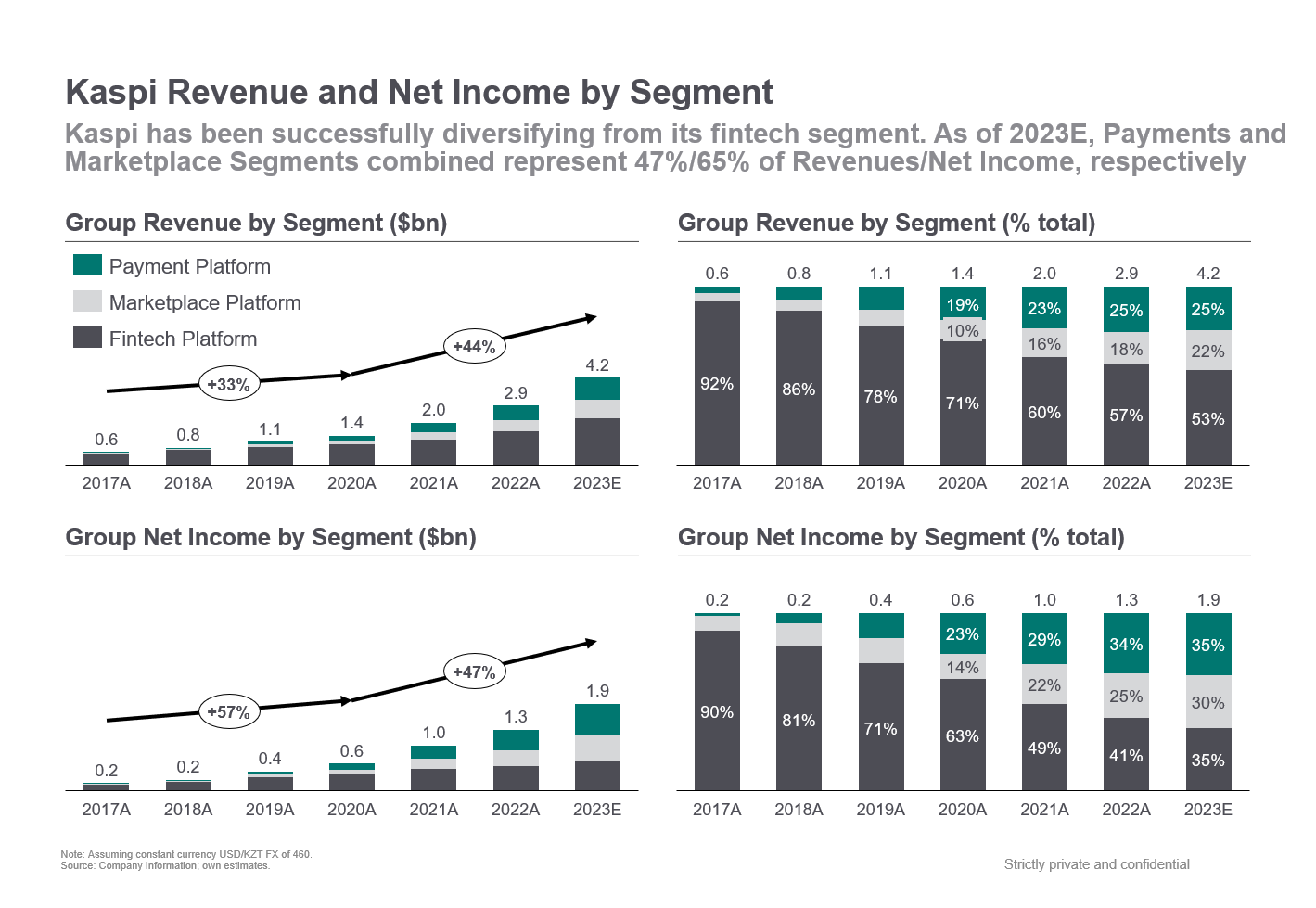
Kaspi transcends being “just” a consumer-focused SuperApp; it's also pivotal for merchants, creating a self-reinforcing ecosystem offering businesses tools for sales, payments, and customer engagement to empower them to thrive in the digital economy. This dual approach enhances consumer experiences and drives merchant success, fostering a closed-loop ecosystem where both parties benefit and contribute to Kaspi's expansive network. This symbiotic relationship underpins the platform's continual growth and innovation.
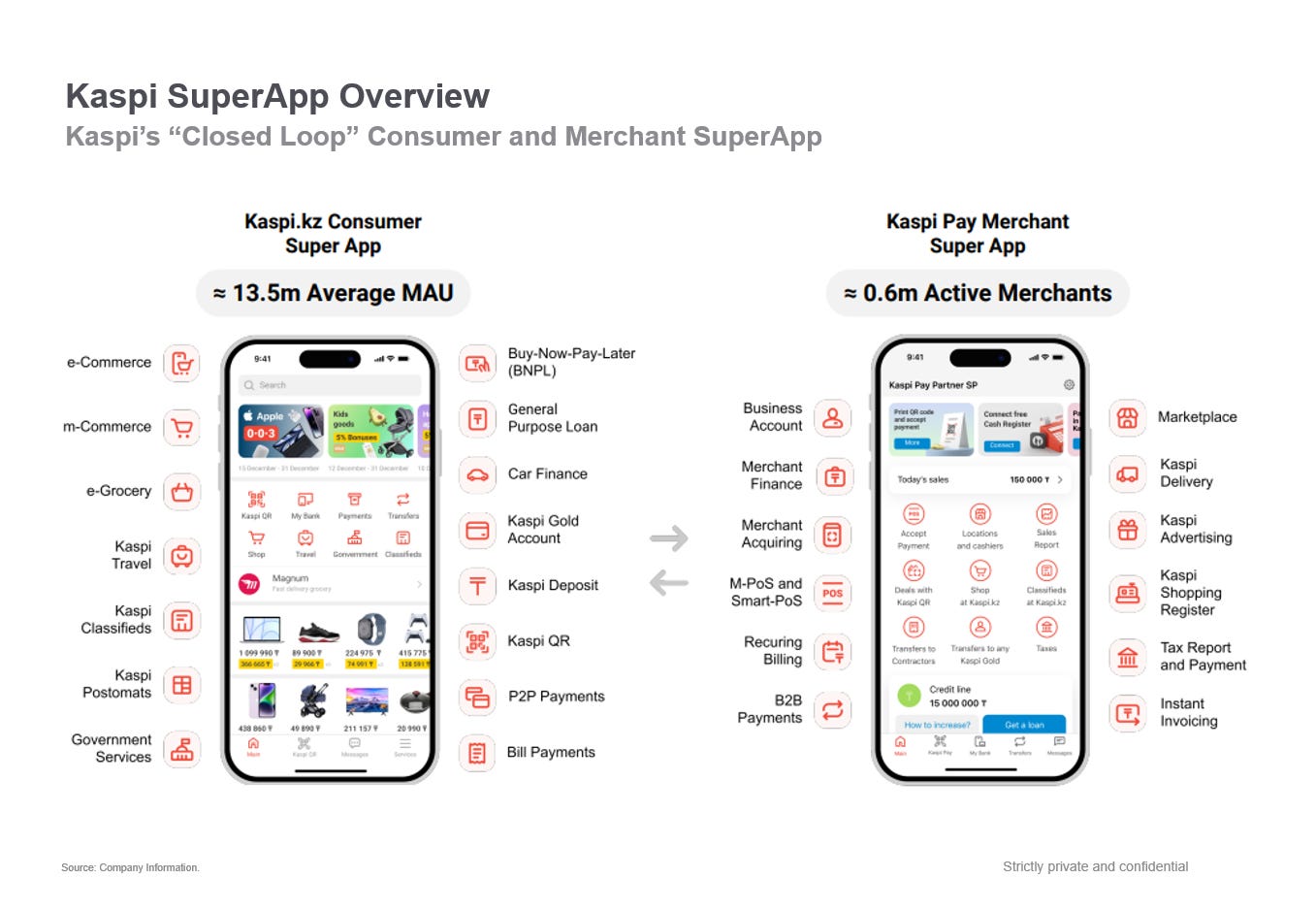
Speaking about the pace of innovation, Kaspi’s commitment to keep reinventing itself and expanding its addressable market is evident in its continuous product launches, including many of its latest ventures. The SuperApp has adeptly expanded into new domains with the launch of Classifieds (akin to AutoTrader; LON:AUTO), e-Grocery (akin to DoorDash; NASDAQ:DASH), and Travel services (akin to Booking.com; NASDAQ:BKNG), rapidly establishing market leadership in each. This expansion not only diversifies Kaspi's offerings but also cements its status as a pivotal, all-encompassing platform for consumers' diverse needs in Kazakhstan, from daily essentials to leisure and lifestyle.
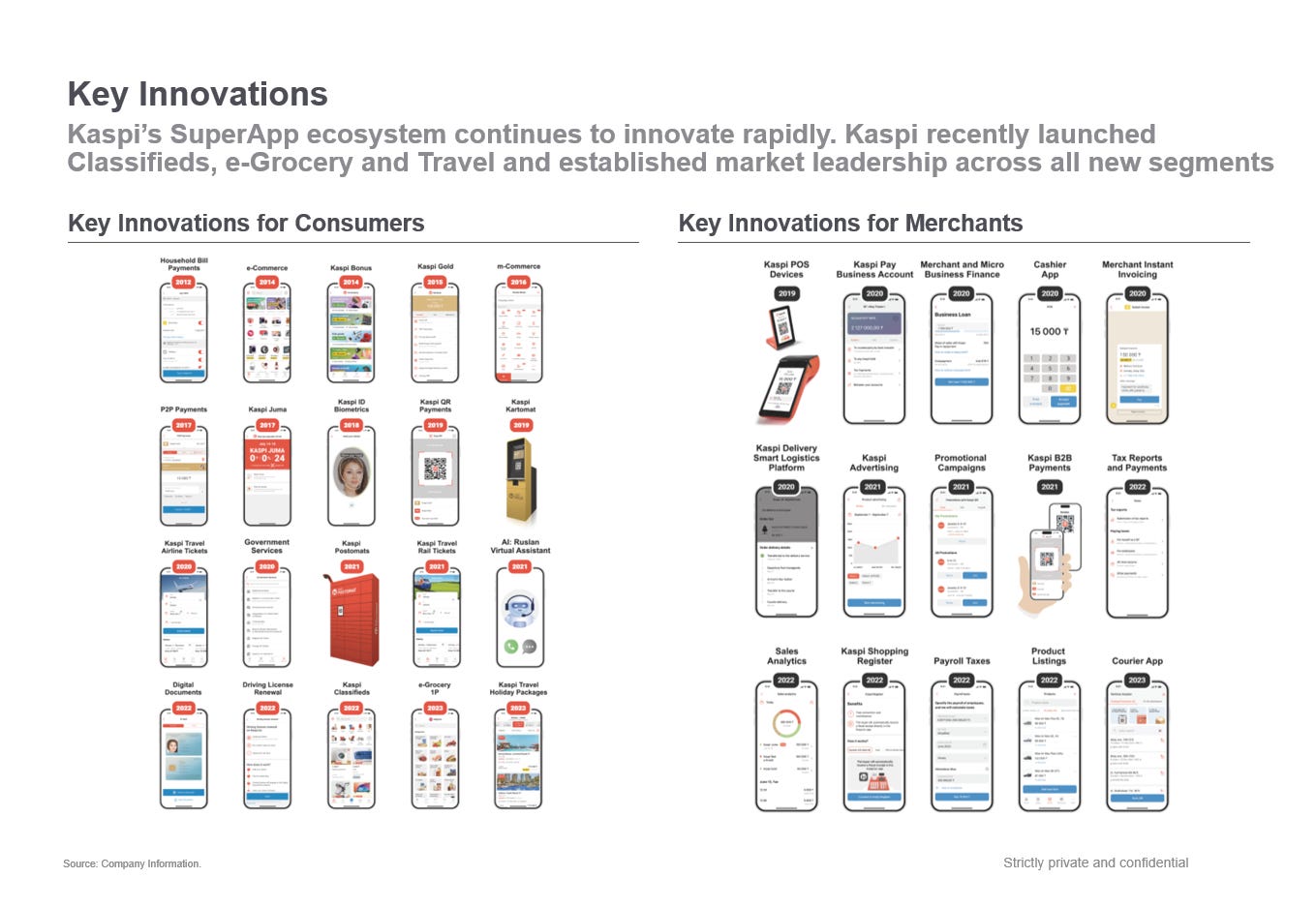
As of writing, Kaspi has arguably established the widest set of products and features across all major SuperApps globally, including such behemoths as Alibaba, Mercado Libre, and Nubank. The Company is not stopping there; rumours suggest that the business is debating launching taxi services as soon as 2024, though it is yet to be confirmed (akin to Uber; NYSE:UBER). What might come as a surprise is that Kaspi plays a pivotal role in streamlining government-related services for its citizens. This aspect of Kaspi's platform simplifies various bureaucratic processes, enhancing public service accessibility and efficiency. Such functionality benefits users and reflects Kaspi's positive and constructive relationship with the government, showcasing a collaborative approach to technological and societal advancement. In fact, Kazakh President Kassym-Jomart Tokayev has, on multiple occasions, emphasized the important role of Kaspi in capital market development of Kazakhstan, its impact on improving the life of Kazakh people and overall seems understandably proud and supportive of the business (Kaspi has all it needs to become a truly formative business in the context of Central Asia as Shopify became in Canada, and thus drive entrepreneurship and be a force of innovation in the region).
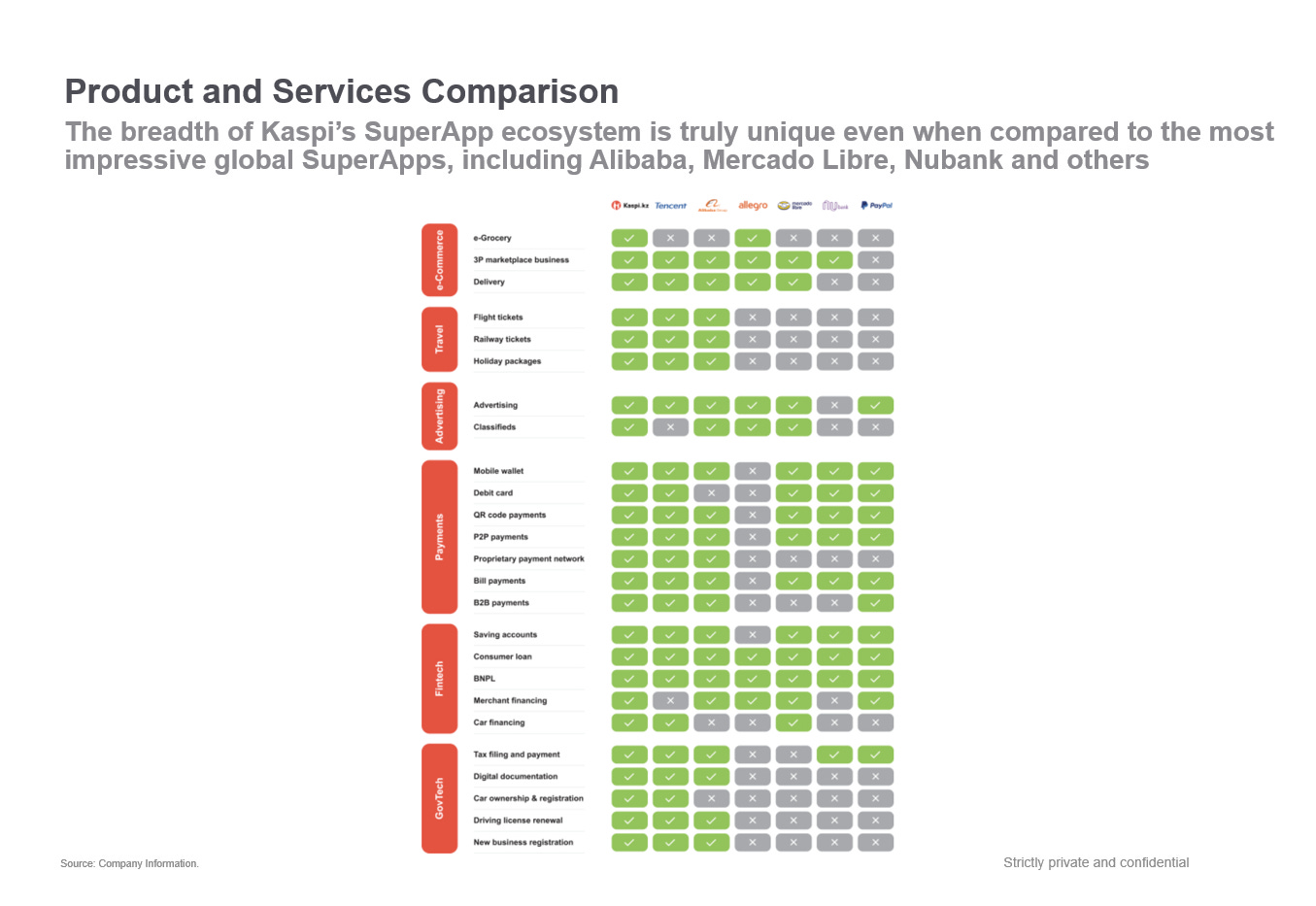
Kaspi’s innovative nature has been rewarded by a significant surge in user engagement, with its DAU to MAU ratio climbing to an impressive 65% as of 2Q23, a leap from 27% just five years ago. This metric, a testament to the SuperApp's sticky user experience, is second only to WeChat's 86%, largely attributed to its messaging capabilities (akin to WhatsApp). Kaspi's multifaceted platform fosters habitual user interaction, with its diversified services seamlessly integrating into its consumers' daily digital routines. Note that the only meaningful competitor is Halyk Bank; however, it is first and foremost a bank with limited SuperApp-like functionalities, hence not much focus on the competitive landscape in this deep dive as Kaspi is truly one-of-a-kind 800-pound gorilla in its end-markets.
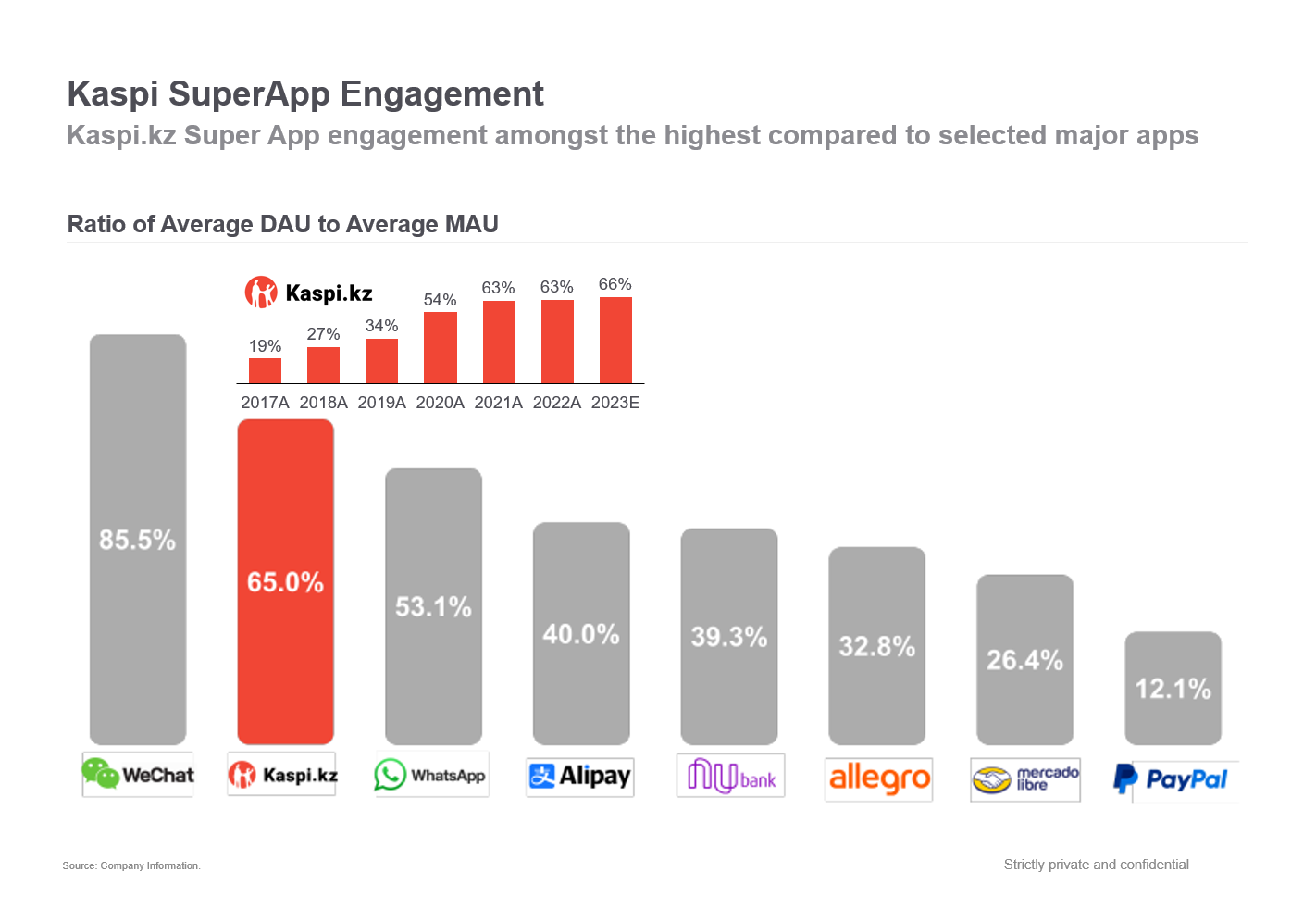
Redefining Efficiency in High-Growth Markets
Efficient growth is vital for scaling a business successfully with a strong Return on Invested Capital (ROIC). Otherwise, businesses end up “spinning the wheels” with growth materially slowing down with scale, profitability being difficult or impossible to reach, and in the worst cases, both of the above combined with the need for incremental capital raises resulting in ongoing shareholder dilution. Unfortunately, few businesses globally can achieve sustainable and attractive growth efficiencies. Most companies struggle to achieve high ROIC, which applies even to the leading cloud businesses, considered one of the best business models in the history of capitalism. Even the best-of-the-class SaaS companies currently face a median marketing spend payback period (on a Gross Profit basis) of around 28 months (see Meritech Software Pulse ). Over time, as businesses scale, efficiency often wanes—initial easy wins are exhausted, and attracting more elusive customers becomes challenging and costly.
Conversely, Kaspi's SuperApp enjoys extremely high engagement, making consumer participation essential to living their lives efficiently - it is not an understatement to say that not using Kaspi in Kazakhstan is equivalent to being an unbanked individual with no form of identification in the Western World. For merchants, Kaspi provides the optimal way to reach their audience, much like specialized platforms such as Rightmove (LSE:RMW) for real estate in the UK or Mercado Libre for e-commerce in LatAm, though as discussed, Kaspi's scope is far broader. This allows for essentially non-existent churn outside merchants going out of business.
Kaspi's efficiency goes beyond its attractive business model and is further propelled by its innovative use of Artificial Intelligence (AI). This technological edge sharpens Kaspi's operational acumen, enabling the Company to scale its revenues with a lean and, in fact, shrinking workforce. The SuperApp's ability to enhance user engagement and merchant success through AI translates into remarkable financial metrics per Full-Time Employee (FTE), reflecting a synergy of growth, profitability, and efficiency rarely seen in the market. I will let the below data speak for itself and highly recommend you compare the below metrics with an excellent database provided by Meritech in their Public SaaS Comparables Table (where you will quickly find that Net Income per Employee is not a disclosed metric because it is not meaningful for the vast majority of publicly listed high-growth companies as they are deeply cash burning due to the above discussed efficiency-related constraints).
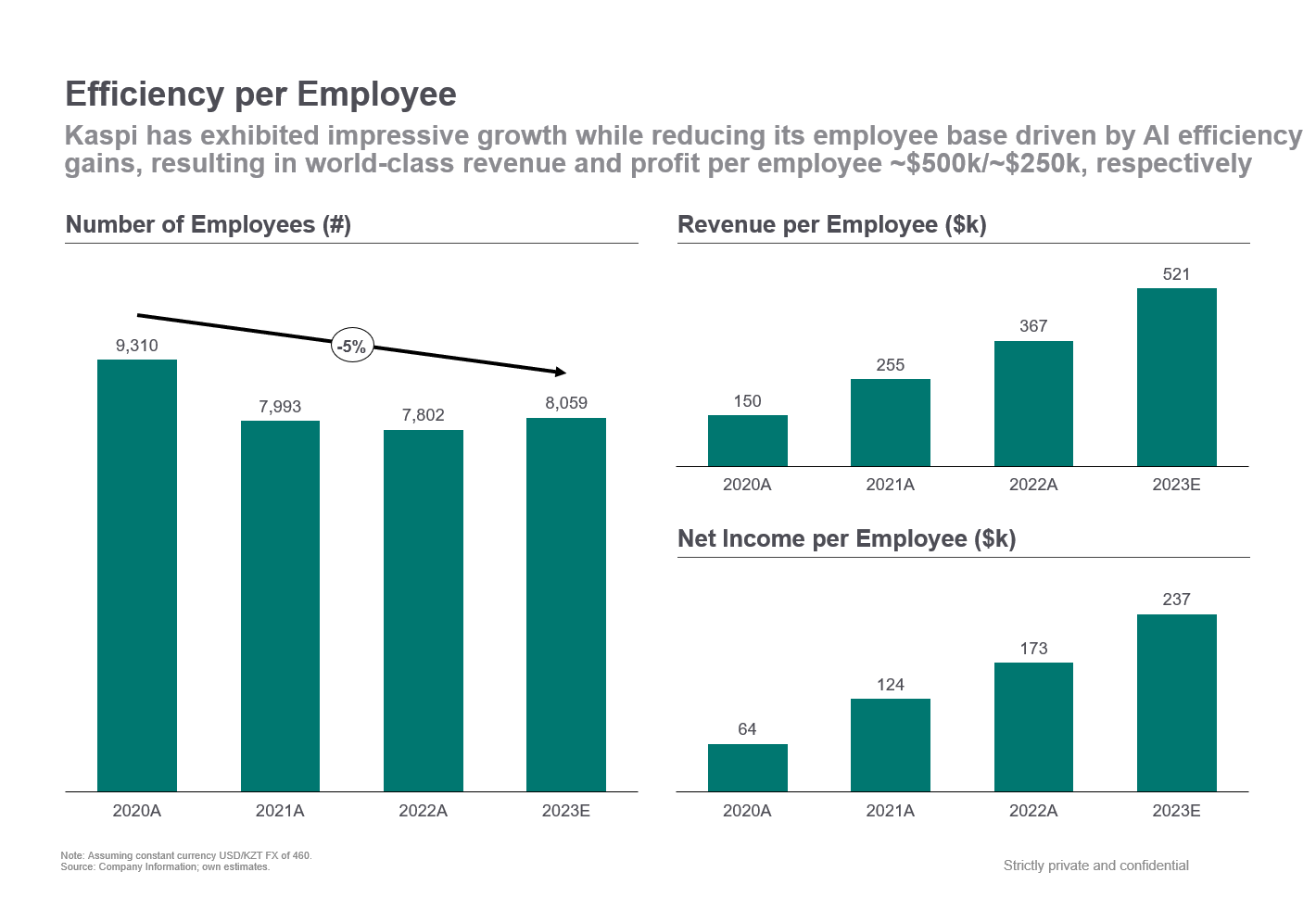
A Customer-First Vision by CEO Mikhail Lomtadze
Kaspi's management, under CEO Mikhail Lomtadze, embodies a long-term, customer-centric philosophy, focusing on product excellence and user experience above all. Lomtadze's strategy hinges on understanding and continually investing in Kaspi's competitive edge, a practice that has led to an ever-expanding market advantage. This approach is reflected in the Company's Net Promoter Score (NPS), which impressively rose from below 40% in the early 2010s to an outstanding ~90%, signalling that customers don’t just use Kaspi — they genuinely love it. This customer satisfaction parallels how Amazon has captivated its user base, making it essentially irrational not to use its services.
“We always proactively seek consumer feedback to evaluate if we are delivering on our mission. Through our Kaspi.kz Super App, we send push notifications asking our consumers to evaluate the quality of specific services and provide us with feedback, shortly after use. On average, approximately 200,000 consumers per month give us such feedback. The data and results we derive from feedback form an integral part of our product development process. For our employees, consumer feedback forms the main KPIs by which they are held accountable.”
Furthermore, this customer-first approach is deeply ingrained in the Company's ethos, partly because all executive officers and members of the Board of Directors as a group (9 persons in total) hold a significant stake in the business, owning 57% of the outstanding shares, currently worth ~$10bn. This substantial ownership ensures that the management's interests are closely aligned with the long-term success and sustainability of Kaspi, mirroring the commitment to continually enhancing service quality and value. Under Lomtadze's stewardship, Kaspi is not just maintaining its market position but is set to become even more integral to its customers' lives. To better understand the impressive culture, I suggest watching publicly available videos on YouTube , listening to quarterly report recordings, and perhaps reading through the Kaspi.kz IPO Harvard Business School Case Study .
Kazakhstan Beyond Borat: A Digital Powerhouse and Eurasian Economic Strategic Keystone
While some may hesitate to invest in an asset exposed to Kazakhstan's economy, perceiving it as an underexplored market funnily known through the "Borat" films, the country's reality is strikingly different. Kazakhstan is exceptionally digitally savvy, with a robust online infrastructure facilitated by the rise of tech giants like Kaspi.
It's also a pivotal node for the Belt and Road Initiative (BRI), vital for Eurasian economic integration, from which all regional stakeholders, including China, Europe, Russia and the Middle East, stand to gain (hence, in my view, the irrelevance of the potential worry that Kazakhstan might face a similar devastating destiny as Ukraine). The nation's commitment to BRI is evidenced by significant infrastructure investments and a surge in trade volume with all stakeholders (including increasingly with Europe to provide Oil & Gas, and with France specifically to replace Niger as the core provider of uranium). Kazakhstan's role extends beyond logistics; it's pivotal in industrial and agricultural collaborations under the BRI, with numerous joint projects underway. These partnerships underscore Kazakhstan's growing importance in regional and global economic dynamics. In 2023, Foreign Direct Investments in Kazakhstan grew by 18% and reached $28bn, a record high for Kazakhstan over the past decade.
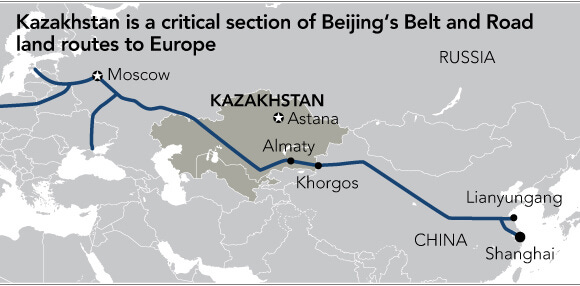
It is also worth noting that on January 1, 2024, the UAE, Saudi Arabia, Ethiopia, Egypt, and Iran officially became members of BRICS. They joined Brazil, Russia, India, China, and South Africa as a formidable economic powerhouse, representing 29% of global GDP and 43% of global oil production. Kazakhstan has shown a keen interest in joining BRICS and will likely do so in the coming year(s), further cementing its geopolitical and economic significance.
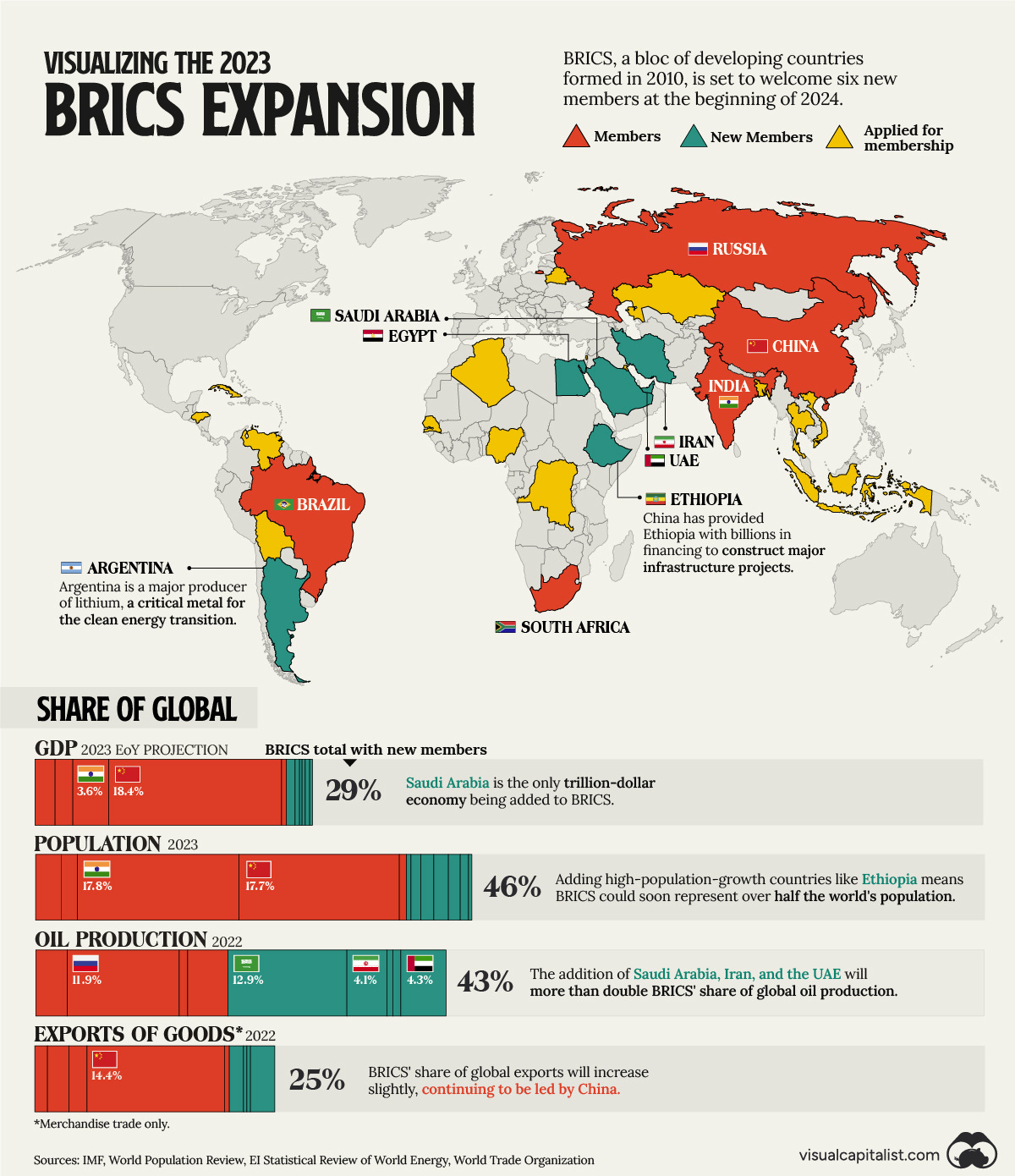
Economically, Kazakhstan showcases a trade surplus, abundant natural resources, and a trajectory of growing GDP and income per capita, with inflation increasingly being tamed, resulting in decreasing interest rates, which should further accelerate the economy's and Kaspi’s growth. Below is an overview of a few selected statistics, though I urge you to explore an excellent TradingEconomics database with a broader set of economic indicators that would allow you to form your view based on your risk tolerance.
It is also worth mentioning that Moody's upgraded Kazakhstan's outlook from "stable" to "positive" on October 27, 2023, acknowledging the country's significant progress in diversifying its economy and demonstrating stronger growth prospects than its peers. This positive shift reflects Kazakhstan's commitment to reforms and improving the effectiveness of state institutions. Moody's recognizes Kazakhstan's low debt burden (~25% Debt to GDP vs ~130% in the US) and substantial international reserves, enhancing its resilience to external risks and underscoring its economic strengths.
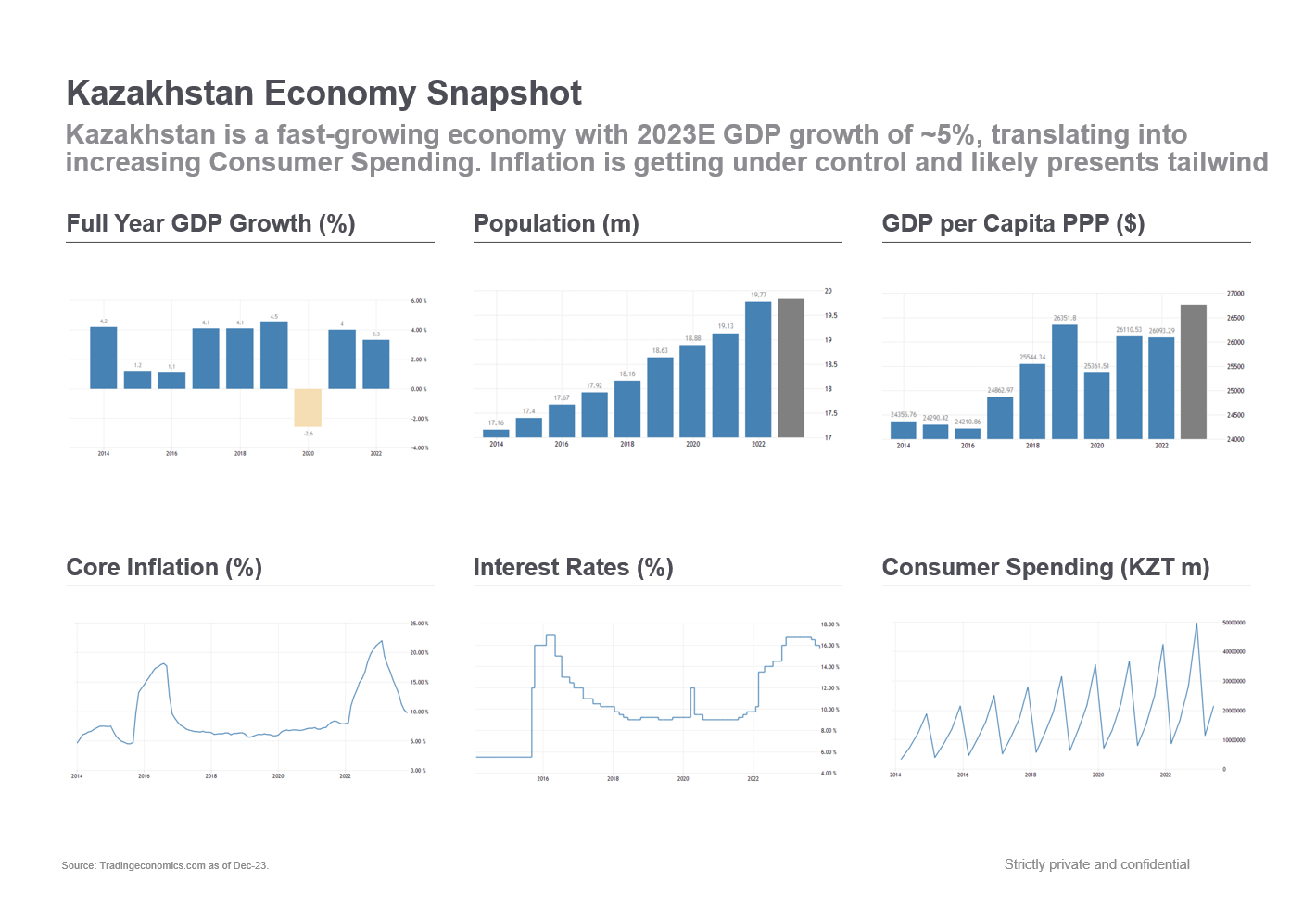
The Kazakhstani Tenge (KZT) has experienced historical depreciation, largely influenced by external factors and the nation's reliance on raw materials, particularly oil and metals, which account for a significant portion of its economy and currency revenues. This dependence prompted efforts by the Kazakh government to diversify the economy away from these sectors, aiming to mitigate the impact of fluctuating commodity prices on the national currency.
In recent years, the Tenge has shown signs of strengthening. For instance, in 2023, the US dollar exchange rate against the Tenge decreased by ~2%, making Tenge one of the few currencies globally strengthening versus the US dollar. This recent strengthening is attributed to various factors, including economic measures taken by the National Bank of Kazakhstan, the country's growing economic resilience, Kazakhstan's substantial reserves, including assets of the National Fund and gold and forex reserves of the National Bank, which are significant relative to the country's GDP.
Operating & Returns Model
I'm committed to ensuring that all my readers, including those who access my free content, receive valuable insights. To this end, I'm sharing key excerpts from my comprehensive operating & returns model, offering a glimpse into the detailed analysis available. Below, you'll find a snippet of the Marketplace Platform Deep Dive and an overview of the Summary P&L and Returns calculations.
However, to truly delve deeper and tailor your investment thesis, I've reserved the full model for my paid subscribers. This exclusive content includes a Kazakh Macro Overview, an in-depth analysis of both the Payments and Fintech Platforms, a Summary of Operating Free Cash Flow build, and detailed Capital Allocation calculations, which are crucial for reinvesting dividends. My paid subscribers support my work, and in return, I ensure they receive substantial additional value, enabling a more nuanced and personalized investment approach.
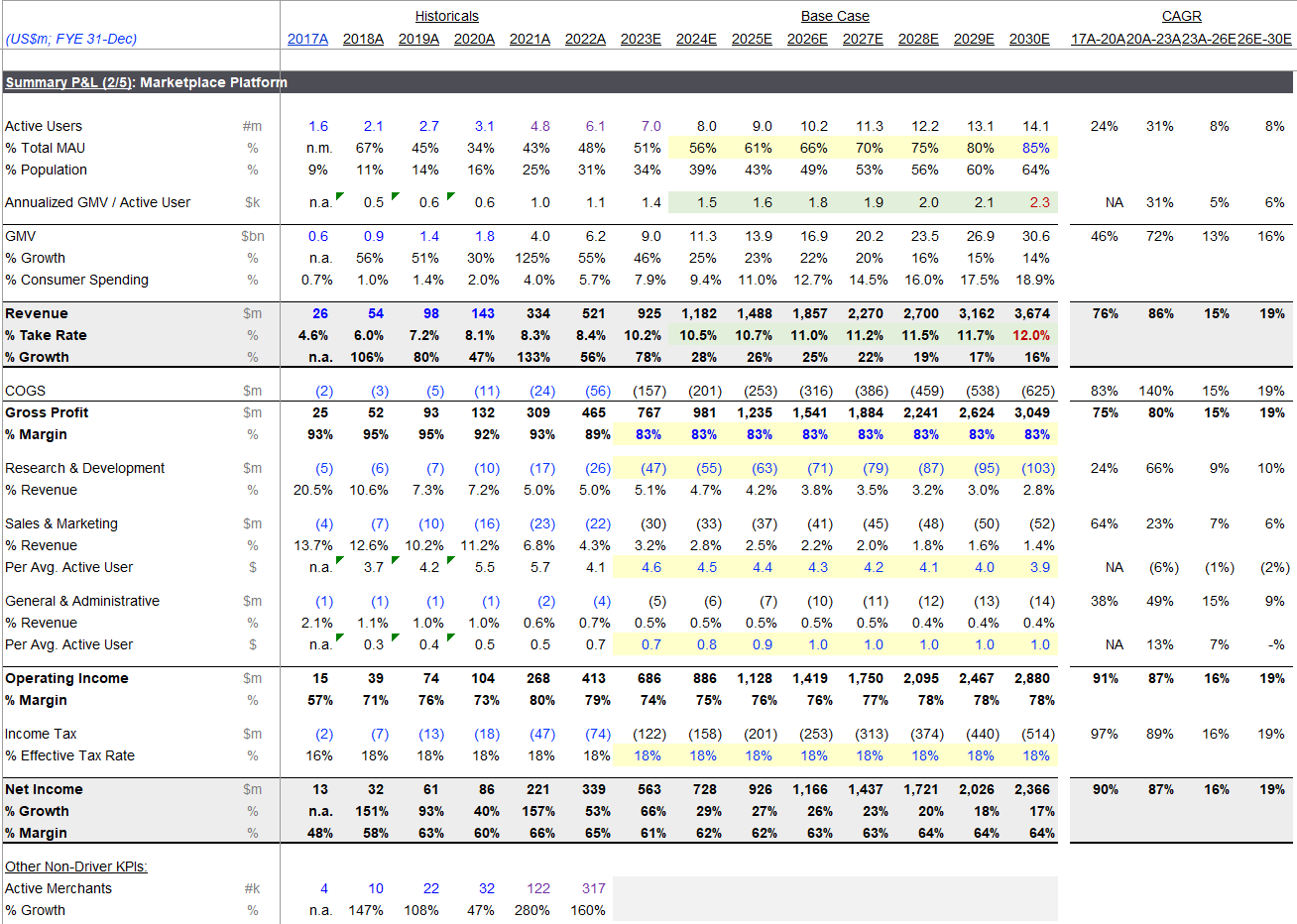
Potential Multibagger Hiding in Plain Sight?
It's startling to observe Kaspi's valuation given all that has been discussed thus far, especially when compared with Mercado Libre. Despite Kaspi's robust business model, substantial profitability, a deep competitive moat, and significant market traction, it's shocking to see it trading at a mere ~7x NTM P/E. This is drastically low compared to Mercado Libre's ~48x NTM P/E. Kaspi's strong NTM dividend yield of ~10% and its consistent share buybacks add further to its appeal (note that the business is continuously buying back ~$2.5m worth of shares per week, which more than offsets any dilution from stock-based compensation, yet another attractive facet of Kaspi compared to most of the growth-stage businesses in the Western World). This stark disparity in valuation, with Kaspi valued at a ~85% discount to Mercado Libre, is not just surprising but potentially indicates a massive undervaluation for a Company with Kaspi's impressive credentials.
Note: The chart below shows LTM P/E (the current ~10x LTM P/E translates into ~7x NTM P/E).
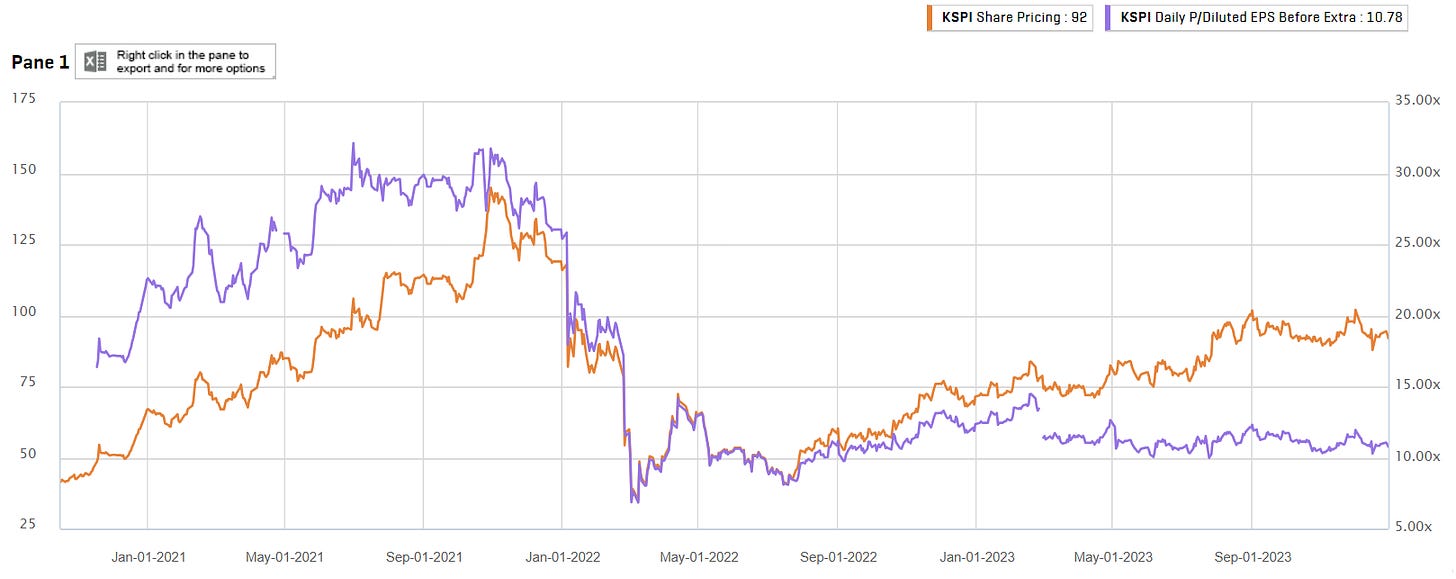
Before 2022, Kaspi was trading at ~20x NTM P/E (while the Company was meaningfully smaller and its product and service offering far less developed). However, geopolitical tensions, notably the Ukraine war, sparked concerns about regional stability, leading to a sharp decline in the stock's valuation to the ~7x NTM P/E territory, where it has stayed since. This undervaluation persists despite Kazakhstan's distinct geopolitical context; the likelihood of similar conflicts spilling into Kazakhstan is widely considered very low by regional experts.
Kaspi's impending NASDAQ listing in 1Q24E could be a major catalyst for revaluation (Kaspi is currently listed on the London Stock Exchange). The listing is expected to significantly raise the Company's profile among international investors, attracting the attention of equity research analysts, emerging market hedge funds, and investors seeking exposure to growing fintech, e-commerce, and payments sectors. This increased visibility and subsequent analysis could lead to a more accurate appreciation of Kaspi's true market value. Based on my analysis, here are the expected returns for Kaspi:
Downside Case (15% probability) : With a ~10% NTM dividend yield and ~20% NTM growth, maintaining a constant multiple, we could see a 1.3x Money on Invested Capital (MOIC) in one year.
Base Case (50% probability) : Adding potential multiple expansion back to the 20x NTM P/E to the same dividend yield and ~30% NTM growth, the expectation is a 3.7x 1-year MOIC.
Upside Case (35% probability) : Should the multiple expand to 30x NTM P/E, closer to Mercado Libre (yet still far below ~48x), and growth deliving ~35% NTM growth, a 6.0x MOIC is conceivable.
As attractive as the above illustrative returns appear, the real upside lies in holding Kaspi for the long term, given its vast potential. For a detailed assessment of this potential, I encourage you to explore the financial model available in the paid section.
Putting My Money Where My Mouth Is
In the spirit of Charlie Munger's wisdom, which emphasizes the value of decisive action in investing, I have embarked on a significant personal financial decision. Drawing from my extensive professional investing experience across the world’s leading investment banks and technology-focused private equity firms, I believe I have identified a rare opportunity in the market. Kaspi, a Company that debuted on the London Stock Exchange two years ago, presents what I believe to be a deeply mispriced opportunity. It has somehow stayed under the radar of many international investors, likely due to its listing on the less-observed London exchange (no helpful research analysis covering the stock, daily trading volume of ~$3m, which should be more of a rounding error considering the Market Capitalization of nearly $20bn). Recognizing this, I am investing a substantial portion of my liquid wealth in Kaspi and committing to a long-term hold. This decision is driven by my conviction in Kaspi's potential and my belief that the market will eventually recognize and correct this undervaluation, resulting in potential returns that I currently do not see in other publicly listed investment opportunities.

To all my current, new, and future subscribers, I deeply value and appreciate you! I also warmly invite you to embark on this thrilling journey with me. Your insights and discussions are not just welcomed but crucial as we collectively explore Market Wonders . Together, we aim to uncover opportunities that lead us towards our common goal of financial independence . Let's engage, learn, and grow together in this exciting pursuit!
Analyst’s Disclosure: I have a beneficial long position in the shares of Kaspi either through stock ownership, options, or other derivatives. I wrote this article myself, and it expresses my own opinions. I am not receiving compensation for it (other than from my paid subscribers). I have no business relationship with any company whose stock is mentioned in this article. Past performance is no guarantee of future results. No recommendation or advice is being given as to whether any investment is suitable for any particular investor.
Ready for more?
- Friday, 12 April, 2024
- Almaty 41 °F / 5 °C
- Astana 41 °F / 5 °C

- All Stories
- Kazakhstan Region Profiles: A Deep Dive Into the Heart of Central Asia
- State of the Nation
- Election 2022
- Election 2023
- Astana International Forum
- Kazakhstan’s Presidency in SCO
- Central Asia
“APP”etite for Innovation: Look at Kazakhstan’s First Nasdaq Listed Company, Kaspi.kz
By Assel Nussupova in Business , International on 26 January 2024
Over 30 years ago, Kazakhstan was little known outside Central Asia despite its vast size and rich resources. Long isolated under Russian and then Soviet rule, it only opened to global trade after declaring independence in 1991, embarking on a journey towards a market-oriented, capitalistic society. This transition included integrating concepts like competition and innovation into its economic vocabulary. Despite significant strides, such as attracting global corporations to its oil sector and modernizing its infrastructure and government, Kazakhstan struggled for international recognition, potentially needing a notable brand or celebrity to elevate its global profile.
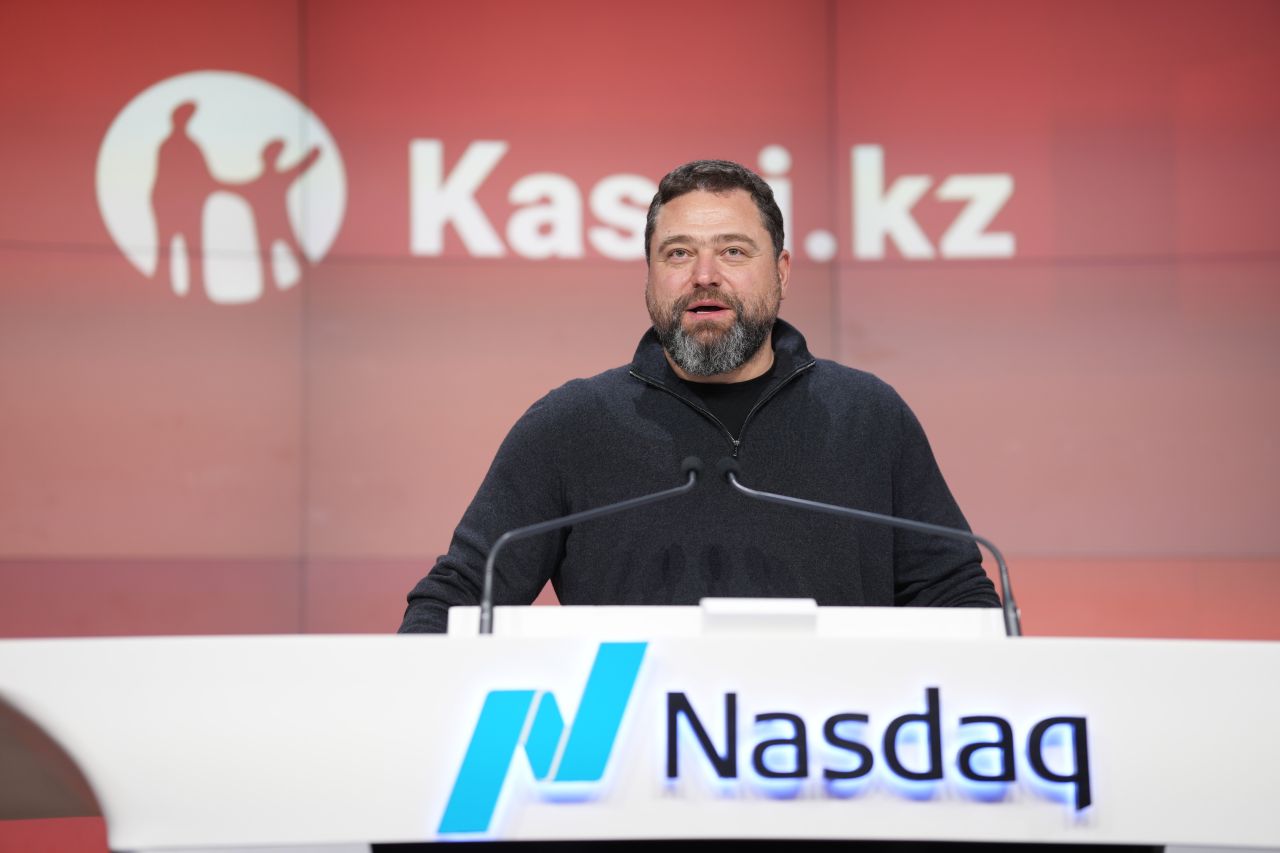
Mikhail Lomtadze during the bell ringing ceremony at Nasdaq to mark the company’s stock listing on Jan. 19 in New York. Photo credit: Nasdaq.
In recent years, Kazakhstan’s global recognition has increased, partly thanks to notable figures like professional boxer Gennady Golovkin, the first Kazakh featured in an Apple Watch commercial and Nike’s Jordan brand, and singer Dimash Kudaibergen, known for his exceptional vocal range. Despite their contributions, the country’s image as resource-dependent persisted. However, significant changes have been occurring. Five years ago, Kazakhstan’s first president Nursultan Nazarbayev stepped down, succeeded by Kassym-Jomart Tokayev, who has focused on reforms, technology adoption, and fostering an entrepreneurial economy. These efforts, along with the rise of tech-savvy entrepreneurs, are reshaping Kazakhstan’s global image, highlighting its intellectual potential and talent beyond natural resources.
In a thriving market economy like Kazakhstan’s, capital gravitates towards the most efficient and profitable ventures. A prime example is the innovative super app Kaspi.kz, which offers a range of services from cashless payments to vacation booking and accessing government services. This app has not only enhanced the lives of millions in Kazakhstan but also raised the country’s profile. Recently, Kaspi.kz made headlines with its successful Nasdaq IPO, a first for a Kazakh company.

Photo credit: Nasdaq. Behind Kaspi’s success is CEO Mikhail Lomtadze, a co-founder who envisioned greatness against the odds. Under his leadership, Kaspi.kz has become the largest and most advanced company in Kazakhstan and Central Asia. In 2022, the app processed more transactions than Mastercard and Visa combined in Kazakhstan.
Kaspi’s Nasdaq debut, following its listing on the London Stock Exchange less than three years prior, marks a significant milestone. The company’s achievements have not gone unnoticed by the government of Kazakhstan. President Tokayev recently met with the company’s co-founders Vyacheslav Kim and Mikhail Lomtadze. We had the opportunity to delve deeper into the company’s journey in an interview with Lomtadze.
Here’s our Q&A with Lomtadze.
Your company focuses on three main areas (payment, marketplace, fintech). Could you tell a little about the products and services you offer? Who is your target customer base?
We operate a two-sided Super App business model: the Kaspi.kz Super App for consumers and the Kaspi Pay Super App for merchants and entrepreneurs.
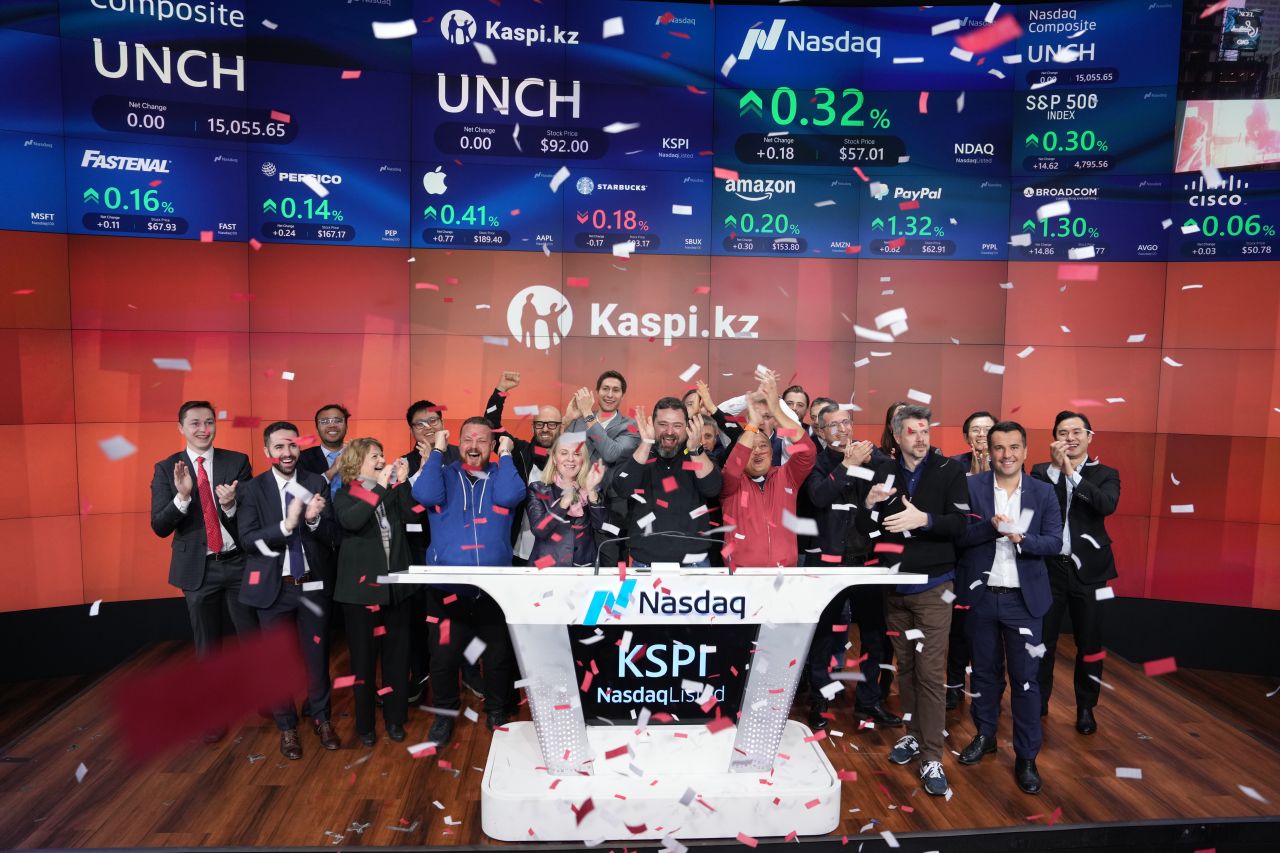
Photo credit: Nasdaq.
Being a Super App first is at the core of everything we do. We call our mobile applications Super Apps because, unlike single-purpose apps, our apps integrate different and complex services that are used on a daily basis in one place, in a way that is simple and seamless for users.
With the Kaspi.kz Super App, consumers can shop online with fast and free e-Commerce and e-Grocery delivery, use m-Commerce to find and shop at local merchants, book travel and holidays with Kaspi Travel, pay with Kaspi QR throughout Kazakhstan, shop with our BNPL products, pay their household bills and save for the future. With integrated Government Services, consumers can also access digital documents, including passports, renew their driving licenses, and transfer car ownership.
The Kaspi.kz Super App has 13.5 million average monthly active users, 65% of whom access our services daily, giving it one of the highest levels of daily engagement among major mobile apps globally, trailing only behind Tencent’s WeChat in China.
With the Kaspi Pay Super App, merchants can sell online using e-Commerce or list their businesses and offers using m-Commerce, organize nationwide delivery with Kaspi Delivery Smart Logistics, run ad campaigns with Kaspi Advertising, participate in our promotional events and access merchant financing. Merchants can issue and instantly settle invoices, accept payments, pay suppliers and track their turnover. Kaspi Classifieds allows merchants to advertise their services and job opportunities. Merchants also have access to Government Services, including tools to initially register their business, issue fiscal receipts for all types of payments, calculate and pay their taxes, and file tax reports.
What is the company’s revenue model, and how does it plan to achieve long-term profitability?
With our two-sided Super App business model, the Kaspi.kz and Kaspi Pay Super Apps connect and facilitate transactions between consumers and merchants, from which we generate revenue. Popular payments and shopping products attract more customers, which in turn attracts more merchants, which in turn leads to more consumers and transactions. We also integrate financing options for both consumers and merchants.
Our Super Apps technology platform leads to high levels of operational efficiency and offers a powerful mix of scale and profitability.
We typically target large addressable markets, such as grocery and travel, where scale translates into meaningful net income and net income growth. As a result, we believe our Super App business model creates a structurally more profitable business than a stand-alone equivalent model.
What growth strategy has Kaspi.kz outlined post-IPO, and how does it plan to use the funds raised?
Our mission is to improve people’s daily lives by developing innovative, highly relevant, world-class mobile services. We see a substantial growth opportunity as we keep growing by innovating and digitizing more aspects of daily life.
In fact, we have a proven track record of creating new revenue streams. In only the last three years, among other services, we have launched Kaspi Travel, Kaspi B2B Payments and Kaspi Postomats. More recently, we launched e-Grocery and Kaspi Classifieds. These services are in different areas, but all benefit from the powerful network effects inherent to our Super App business model. We also keep developing value-added tools for merchants, such as advertising, new delivery offerings and invoicing products.
We believe digitalization will remain a powerful driver of economic transformation globally, and particularly in Kazakhstan and the surrounding region, where consumers are increasingly demanding digital solutions. Kazakhstan’s social and economic backdrop, namely the country’s young and growing population, rapidly increasing income levels and fast-growing GDP is incredibly supportive.
Our Nasdaq IPO did not raise new funds for the company but was designed to increase stock trading liquidity by attracting a wide range of new, high quality, international investors, most of whom have never invested in Kazakhstan before.
What’s the most exciting upcoming development or project at Kaspi.kz that you are particularly enthusiastic about? Where do you envision the company in 10 years?
We have a proven track record of introducing products and services that have been quickly adopted.
With the opportunities offered by digitalization, the pipeline of our new products remains strong.
We also want to take Kaspi.kz to other markets. Over the long term, our ambition is to serve 100 million users. With our highly scalable, asset-light Super App business model, we believe we can expand into new geographies as quickly and efficiently as we have expanded into new verticals in Kazakhstan.
While you have a strong foothold in Kazakhstan, which regions or segments hold the most potential for you to expand to?
In Azerbaijan we operate the leading classifieds platforms Turbo.az (cars), Tap.az (new and used items) and Bina.az (real estate). Since 2021, we have operated the payments platform Portmone in Ukraine. In Uzbekistan we are invested in Autoelon.uz, a leading car marketplace.
Over the long term, our ambition is to extend our geographical reach and profitably serve 100 million users, up from 13.5 million we currently serve.
Our asset-light, Super App business model is highly scalable and will allow us to expand into new geographies as quickly and efficiently as we have expanded into new business line verticals in Kazakhstan. We regularly review and assess the status of markets in neighboring countries as well as other select markets.
As we expand, our strategy will be driven by our Super App business model, and we will aim to target large addressable and profitable market segments, with the opportunity to scale all our platforms and offer a deep suite of products.
What measures have you taken to ensure the security of data and financial transactions on your platform?
One example is our Kaspi ID biometrics proprietary technology which we use to enable transactions, prevents fraud and provides extra security to our consumers. Face recognition technology also enables transactions in our Super Apps and at our ATMs.
What role do you see AI playing in your business currently and in the future?
This is a very popular question currently but we never jump on the latest bandwagon. In the case of AI, although I like to joke that it’s no substitute for our own intelligence, we have been seeing the significant benefits that it brings over the years.
For example, we developed our AI-powered virtual assistant several years ago and now leverage this powerful tool across many areas of our consumer-facing functions. Even with rapid growth, the total number of our full-time employees has been reduced from 9,310 in 2020 to 7,802 in 2022. Our virtual assistant, “Ruslan,” now does the work of approximately 1,000 employees across multiple functions, saving us approximately ₸5.3 billion (approximately $11 million) annually. I suspect you won’t find many fast-growing technology companies that have been able to reduce their headcount substantially, and “Ruslan” is just one of a growing number of examples of how we are using AI to improve what we do.
The Kazakh government is signaling that it wants to embrace technology, diversify the economy and attract foreign investment. How does Kaspi.kz fit into the emerging Kazakh economy?
Kaspi.kz is at the forefront of the new digital revolution, redefined by our Super Apps. The combination of our scale with consumers and merchants, reinforced by our Super App strategy, puts us in an extremely strong position. With the multi-year structural growth opportunity offered by digitalization in Kazakhstan still ahead of us, we thoroughly intend to capture it.
As Kazakhstan’s first Nasdaq listed company, we are showcasing to the world’s largest investors many of the positives that Kazakhstan has to offer. Over the next couple of years these investors will travel to Kazakhstan, not only to visit Kaspi.kz but to seek out the next wave of high growth and innovative investment opportunities.
From the author:
The future seems very bright for Kaspi.kz, a super-app focused on providing a super experience for its eager customers, simplifying transactions and engagement in an ever-widening variety of digital areas. Its history-making IPO on the Nasdaq provided inspiration for other Kazakh companies to seek out greater engagement with the global economy. While Kazakhstan’s economic past has often been defined by oil and gas, Kaspi.kz is proving that technology and innovation also flow abundantly through the land.
Get The Astana Times stories sent directly to you! Sign up via the website or subscribe to our Twitter , Facebook , Instagram , Telegram , YouTube and Tiktok !
Most Recent Stories
- Tokayev Outlines Priorities for Kazakhstan’s Science, Technology Development
- Kostanai Region Recovers After Flood: Residents Share Personal Experience
- Kazakh Artists Rally Support for Flood Rescuers (Video)
- Kazakhstan, Belarus Set to Foster Cooperation
- Kazakhstan, Georgia to Enhance Cooperation in Trans-Caspian International Transport Route
- Kazakhstan, Finland Strengthen Trade and Transport Ties at Commission Meeting
- News Digest: Foreign Media on Trans-Caspian International Transport Route, Critical Raw Materials and More
- Brussels Meeting Focuses on Kazakhstan-EU Trade, Investment Ties
- National Bank of Kazakhstan Keeps Base Rate at 14.75%
- Kazakhstan Evacuates Almost 100,000 People Amid Massive Floods
- Dialogue of Civilisations
- Editor’s Picks
- International
- Constitutional Referendum
- National Overview
- © 2010-2024 The Astana Times
- Privacy Policy
- About Us
Fintech Heavyweight Kaspi.kz Valued at $17.5 Billion in Tepid Nasdaq Debut

The Kaspi Bank logo in seen at the bank's branch in Almaty, Kazakhstan October 7, 2019. REUTERS/Pavel Mikheyev/File Photo
(Reuters) -Kaspi.kz was valued at $17.51 billion when its shares debuted 0.5% above their offer price on Friday, a day after the Kazakhstan-based banking and fintech giant fetched $1 billion for its investors in an upsized IPO.
The lukewarm reception, especially on a day when the benchmark S&P 500 index was just shy of a record close, indicated investor caution around new listings was firmly in place, spilling into 2024 after almost two years of sluggish U.S. IPO markets.
Still, a string of startups such as Reddit and ServiceTitan are looking to go public over the next few months, as dovish expectations around the Federal Reserve's interest rate trajectory encourages IPO hopefuls.
Kaspi.kz's American depositary shares opened at $92.50 each, compared with their IPO price of $92.
Its share sale had fetched over $1 billion for its billionaire executives, co-founder Vyacheslav Kim and CEO Mikheil Lomtadze, as well as another shareholder, Asia Equity Partners. No proceeds went to the company.
The investors upsized their offering to 11.3 million shares on Thursday, from earlier plans to sell 9 million shares.
Kaspi.kz operates through three segments - payments, marketplace and fintech - and caters to both consumers and merchants. Besides e-commerce purchases, its app lets customers access buy now, pay later (BNPL) debt, renew their driving licenses and register their businesses.
The diversification that conglomerates like Kaspi.kz offer can benefit investors, since one unit can cushion the hit if another suffers.
On the other hand, myriad businesses can bring their own risks and make it harder for markets to evaluate the company. For instance, Kaspi.kz's sprawling empire includes an e-grocery business, which is known for its logistical complexity and is viewed as a low-margin business.
Morgan Stanley, J.P. Morgan and Citigroup are the lead underwriters for the IPO.
The company is already listed on the London Stock Exchange, where its valuation exceeds $19 billion.
(Reporting by Niket Nishant in Bengaluru; Editing by Devika Syamnath)
Copyright 2024 Thomson Reuters .
Tags: United States
The Best Financial Tools for You
Credit Cards

Personal Loans

Comparative assessments and other editorial opinions are those of U.S. News and have not been previously reviewed, approved or endorsed by any other entities, such as banks, credit card issuers or travel companies. The content on this page is accurate as of the posting date; however, some of our partner offers may have expired.

Subscribe to our daily newsletter to get investing advice, rankings and stock market news.
See a newsletter example .
You May Also Like
Is it time to invest internationally.
Kate Stalter April 11, 2024

Cheap Dividend Stocks to Buy Under $10
Wayne Duggan April 11, 2024

5 Best Large-Cap Growth Stocks
Glenn Fydenkevez April 11, 2024

7 Dividend Kings to Buy and Hold Forever
Tony Dong April 11, 2024

5 Socially Responsible Investing Apps
Coryanne Hicks April 10, 2024

7 Diabetes and Weight Loss Drug Stocks
Brian O'Connell April 10, 2024

7 Best Socially Responsible Funds
Jeff Reeves April 10, 2024

Fidelity Mutual Funds to Buy and Hold
Tony Dong April 10, 2024

Dividend Stocks to Buy and Hold
Wayne Duggan April 9, 2024

What Is a Stock Market Correction?
Marc Guberti April 9, 2024

If You Invested $10,000 in SMCI IPO

6 of the Best AI ETFs to Buy Now
Tony Dong April 9, 2024

7 Best Cybersecurity Stocks to Buy
Glenn Fydenkevez April 8, 2024

How Bitcoin Mining Is Evolving
Matt Whittaker April 8, 2024

9 of the Best Bond ETFs to Buy Now
Tony Dong April 8, 2024

10 Best Tech Stocks to Buy for 2024
Wayne Duggan April 8, 2024

About the Methodology
U.S. News Staff April 8, 2024
9 Growth Stocks That Also Pay Dividends
Jeff Reeves April 5, 2024


Effects of the Bitcoin Halving Event
Dmytro Spilka April 5, 2024

9 Best Cheap Stocks to Buy Under $5
Ian Bezek April 5, 2024

The largest Payments, Marketplace and Fintech Ecosystem in Kazakhstan
- About Kaspi.kz
Our Platforms
- Financial Information
Our Mobile App
All our services in one Mobile App becoming part of our customers’ daily lives
We have developed an integrated consumer-focused Ecosystem of innovative and diversified services around our three revenue-generating Platforms. Our Platforms enable participants to connect and interact, creating value for each participant of the Kaspi.kz Ecosystem.
- Marketplace
ELECTRONIC VERSIONS OF THE MATERIALS YOU ARE SEEKING TO ACCESS (THE “MATERIALS”) ARE BEING MADE AVAILABLE ON THIS WEBSITE BY JOINT STOCK COMPANY KASPI.KZ (THE “COMPANY”) FOR INFORMATION PURPOSES ONLY. THE MATERIALS ARE NOT DIRECTED AT OR INTENDED TO BE ACCESSIBLE BY PERSONS LOCATED IN THE UNITED STATES OF AMERICA (INCLUDING ITS TERRITORIES AND POSSESSIONS, ANY STATE OF THE UNITED STATES OF AMERICA AND THE DISTRICT OF COLUMBIA) (THE “UNITED STATES”) OR PERSONS RESIDENT OR LOCATED IN AUSTRALIA, CANADA, OR JAPAN OR ANY OTHER JURISDICTION WHERE THE EXTENSION OF AVAILABILITY OF THE MATERIALS WOULD BREACH ANY APPLICABLE LAW OR REGULATION.
IMPORTANT: : You must read the following notice carefully, as it applies to all persons who access this website. Please note that the disclaimer set out below may be altered or updated. You should read it in full each time you visit the site. If you access the Materials on this website, you agree to be bound by the terms and conditions below. If you do not agree to the terms and conditions, do not access this website or view any of the Materials.
Overseas persons
The Materials do not constitute or form a part of any offer or solicitation to purchase or subscribe for securities in the United States, Australia, Canada or Japan or in any jurisdiction where such offers or sales are unlawful (the “ Excluded Territories ”). Any securities issued or sold in connection with an offering have not been, and will not be, registered under the US Securities Act of 1933, as amended, (the “ Securities Act ”) or under any applicable securities laws of any state, province, territory, county or jurisdiction of Australia, Canada or Japan. Accordingly, unless an exemption under the relevant securities laws applies, any such securities cannot be offered, sold, resold, delivered, distributed or otherwise transferred, directly or indirectly, in or into the United States, Australia, Canada or Japan. There will be no public offering of the securities in the United States. The Materials are only addressed to and directed at persons (i) in member states of the European Economic Area (“ Member States ”), who are qualified investors within the meaning of Article 2(e) of the Prospectus Regulation (2017/1129/EC), as amended, and related implementation measures (“ Qualified Investors ”), or (ii) in the United Kingdom, who are Qualified Investors (a) having professional experience in matters relating to investments falling within Article 19(5) of the Financial Services and Markets Act (Financial Promotion) Order 2005, as amended (the “ Order ”); (b) who are high net worth entities described in Article 49(2) (a) to (d) of the Order; or (c) other persons to whom they may lawfully be communicated (all such persons together being referred to as “ Relevant Persons ”). Any investment or investment activity to which the Materials relate is only available to Relevant Persons (in the United Kingdom) and/or to Qualified Investors (in Member States), and will only be engaged with such persons. Persons who are not Relevant Persons (in the United Kingdom) or Qualified Investors (in Member States) must not rely on or act upon the information contained the Materials. If you are not permitted to view the Materials or are in any doubt as to whether you are permitted to view the Materials, please exit this website. The Materials must not be released or otherwise forwarded, distributed or sent in or into the United States, Australia, Canada, Japan or any other jurisdiction where to do so is unlawful.
Basis of access
Access to the Materials is being granted on the website by the Company in good faith and for information purposes only. Any person seeking access to this website represents and warrants to the Company that they are doing so for information purposes only. Making press announcements and other documents available in electronic format does not constitute an offer to sell or the solicitation of an offer to buy any securities in the Company. Further, it does not constitute a recommendation by the Company or any other party to sell or buy securities in the Company.
Confirmation of understanding and acceptance of disclaimer
I warrant that I am not located in the United States, Australia, Canada or Japan or any other jurisdiction where accessing the Materials or the website is unlawful, and I agree that I will not transmit or otherwise send (by any means including by electronic transmission) any Materials (either in whole or in part) to any person in the United States, Australia, Canada or Japan or any other jurisdiction where to do so is unlawful. I have read and understood the information set forth above and agree to be bound by its terms. I understand that the terms set out above may affect my rights. By clicking the ‘ Agree ’ button I confirm that I am permitted to proceed to electronic versions of the Materials.

25% Off Benzinga's Most Powerful Trading Tools
Traders Win More with Benzinga's Exclusive News and Squawk

- Get Benzinga Pro
- Data & APIs
- Our Services
- News Earnings Guidance Dividends M&A Buybacks Legal Interviews Management Offerings IPOs Insider Trades Biotech/FDA Politics Government Healthcare Sports
- Markets Pre-Market After Hours Movers ETFs Forex Cannabis Commodities Options Binary Options Bonds Futures CME Group Global Economics Previews Small-Cap Real Estate Cryptocurrency Penny Stocks Digital Securities Volatility
- Ratings Analyst Color Downgrades Upgrades Initiations Price Target
- Ideas Trade Ideas Covey Trade Ideas Long Ideas Short Ideas Technicals From The Press Jim Cramer Rumors Best Stocks & ETFs Best Penny Stocks Best S&P 500 ETFs Best Swing Trade Stocks Best Blue Chip Stocks Best High-Volume Penny Stocks Best Small Cap ETFs Best Stocks to Day Trade Best REITs
- Money Investing Cryptocurrency Mortgage Insurance Yield Personal Finance Forex Startup Investing Real Estate Investing Credit Cards
- Cannabis Cannabis Conference News Earnings Interviews Deals Regulations Psychedelics
Kazakhstan Floods Impact Kaspi.kz Stock, Analyst Sees Upside Potential: 'Sell-Off Overdone'
Zinger key points.
- Kaspi.kz experiences a 7% decline due to severe flooding in rural Kazakhstan.
- JPMorgan analyst Reginald L. Smith views the sell-off as overdone, citing minimal business impact.
Kaspi.kz JSC ADR KSPI witnessed a 7% decline in its shares on Monday, April 8 after severe flooding struck rural regions of Kazakhstan .
Such occurrences are not uncommon in Kazakhstan. However, the flooding is reported to be the worst natural disaster to hit the nation in 80 years, according to President Kassym-Jomart Tokayev .
The Kaspi Analyst : JPMorgan analyst Reginald L. Smith believes the sell-off has been overdone and presents an opportunity for investors to enter at an attractive price point. Despite the short-term market reaction, Smith reiterates an Overweight rating for Kaspi.kz ADR. His price target of $159 on the stock by Dec. 2024, implies an upside of 28.77%.
The Kaspi Thesis : Smith points out that the impact of the flooding is primarily concentrated in the northern, rural regions of Kazakhstan, with an estimated 75,000 people, mainly adults, directly affected.
This represents less than 1% of the country’s total population and is unlikely to significantly affect Kaspi’s business operations. Notably, major urban centers such as Almaty and Shymkent in southern Kazakhstan remain unaffected, underscoring the localized nature of the disaster.
He emphasizes that Kaspi’s digital ecosystem remains robust, serving over 14 million monthly active users and nearly 600,000 merchants. The company offers a comprehensive suite of consumer and merchant products. They include in-person payments, bill pay, buy now, pay later (BNPL), e-commerce, e-grocery, and consumer banking services.
Also Read: Which Stocks Will Dominate The Future Of Tech? UBS Shares Its Top Picks In AI, Healthtech, Greentech, And Fintech
Undervalued Relative To Fintech Peers
From a valuation perspective, Kaspi.kz appears undervalued relative to its peers in the global e-commerce and fintech space. Despite strong growth and profit margins, the stock trades at just 8.5 times forward adjusted net income estimates for 2024, compared to a peer comp range of 20 to 30 times.
Smith’s price target is based on a forward EV/Sales multiple of 4.2, reflecting the company’s growth potential and market positioning.
While risks such as geopolitical tensions, increased regulation, and slow product adoption exist, Smith remains optimistic about Kaspi.kz’s long-term prospects.
The company maintains a dominant position in Kazakhstan’s digital landscape. Its continued expansion efforts position it well for sustained growth, despite short-term market fluctuations.
Investors may find the current dip in share price an opportune moment to capitalize on the stock’s potential.
KSPI Price Action: Kaspi.kz ADR closed the trading day on Monday at $123.50, down 7% for the day.
Read Next: US Stock Futures Flatline On Inflation Data Worries; Bond Yields Slip While Gold And Oil Surge: Analyst Says ‘Momentum Is Still There’ For Bull Run
© 2024 Benzinga.com. Benzinga does not provide investment advice. All rights reserved.
Trade confidently with insights and alerts from analyst ratings, free reports and breaking news that affects the stocks you care about.
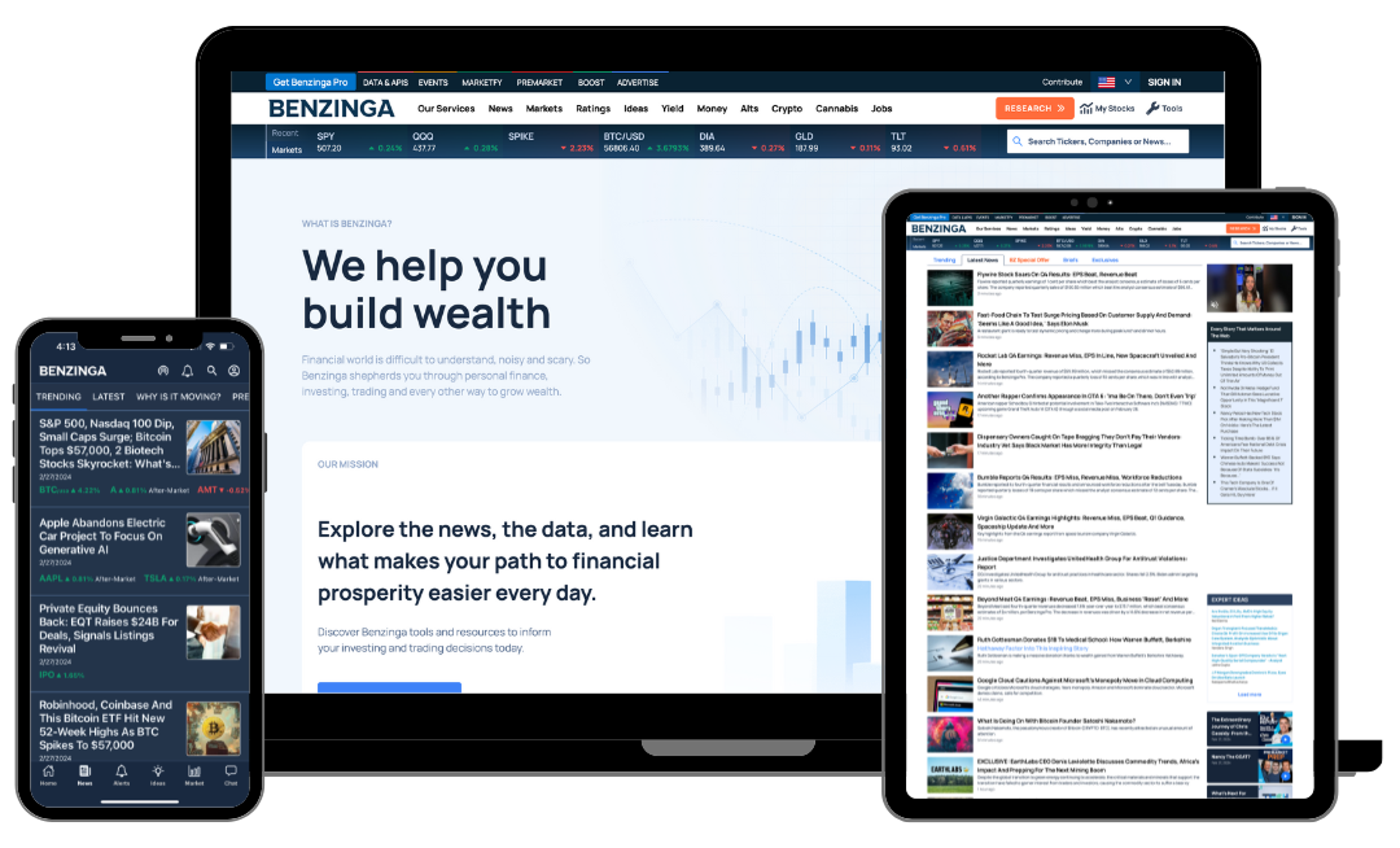
Your update on what’s going on in the Fintech space. Keep up-to-date with news, valuations, mergers, funding, and events. Sign up today!
Kazakh Fintech Giant Kaspi.kz Makes US IPO Filing Public

FILE PHOTO: A woman uses a machine patented by the Kazakh company Kaspi.kz in Almaty, Kazakhstan July 29, 2020. REUTERS/Mariya Gordeyeva/File Photo
(Reuters) - Kazakhstan-based fintech heavyweight Kaspi.kz disclosed a surge in profits and revenue for its most recent quarter on Thursday, when it took another step towards a U.S. listing by making its IPO paperwork public.
The company commands a valuation of nearly $19 billion on the London Stock Exchange, where its global depositary receipts are already listed.
Kaspi.kz joins several richly valued firms heading towards a U.S. listing in 2024. Social media giant Reddit, cloud security company Rubrik and software startup ServiceTitan are also expected to go public next year.
"With a U.S. listing, we believe Kaspi.kz can reach a larger and more diverse investor base that will enjoy being with us for the next stage of our development," co-founder and CEO Mikheil Lomtadze wrote in a letter attached to the IPO prospectus.
Net income for the three months ended Sept. 30 was 232.49 billion Kazakh tenge ($512 million), up 40% from last year. In the same period, revenue grew nearly 51% to 508.44 billion Kazakh tenge.
The company's payments, marketplace and fintech solutions cater to both consumers and merchants. Besides e-commerce purchases, its app also lets customers access buy now, pay later (BNPL) debt, renew their driving licenses and register their businesses.
Kaspi.kz did not disclose the number of shares it expects to sell in the IPO, but said its offer price would be similar to the trading price of its LSE-listed depositary receipts.
It has applied to list its American Depositary Shares (ADS) on the Nasdaq, the bourse where some of the biggest U.S. technology firms are traded.
Morgan Stanley, J.P. Morgan and Citigroup are the lead underwriters for the IPO.
(Reporting by Niket Nishant in Bengaluru; Editing by Shailesh Kuber)
Copyright 2023 Thomson Reuters .
Join the Conversation
Tags: United States , Kazakhstan
America 2024

Health News Bulletin
Stay informed on the latest news on health and COVID-19 from the editors at U.S. News & World Report.
Sign in to manage your newsletters »
Sign up to receive the latest updates from U.S News & World Report and our trusted partners and sponsors. By clicking submit, you are agreeing to our Terms and Conditions & Privacy Policy .
You May Also Like
The 10 worst presidents.
U.S. News Staff Feb. 23, 2024

Cartoons on President Donald Trump
Feb. 1, 2017, at 1:24 p.m.

Photos: Obama Behind the Scenes
April 8, 2022

Photos: Who Supports Joe Biden?
March 11, 2020

U.S.: Threat From Iran ‘Very Credible’
Cecelia Smith-Schoenwalder April 12, 2024

Inflation Up, Consumer Sentiment Steady
Tim Smart April 12, 2024

House GOP Hands Johnson a Win
Aneeta Mathur-Ashton April 12, 2024

A Watershed Moment for America
Lauren Camera April 12, 2024

The Politically Charged Issue of EVs

Johnson Turns to Trump Amid GOP Dissent
Aneeta Mathur-Ashton April 11, 2024

Investment Strategy Partners
Passionate advice in healthcare, tech and life sciences, we focus on due diligence and value creation strategies in the european healthcare space, we cover the healthcare provider, medtech, life sciences and health it space, a dedicated, sector focused team with entrepreneurial investor mindset, combining interdisciplinary backgrounds from natural & pharmaceutical sciences, medicine, engineering, and business to create relevant insights, isp healthcare is a munich-based consultancy focused on the health sector, we provide transaction-oriented advice to professional investors and their portfolio companies.
ISP HEALTHCARE is a healthcare, tech & life sciences consulting firm focused on strategy advice for investors targeting this space and for management of companies in these fields. ISP’s customers are local and international private equity investors with mid & large cap focus as well as management of small & medium enterprises.

Together with our clients we assess the attractiveness of potential targets and develop portfolio companies to their full potential
ISP HEALTHCARE specializes in analyzing and fostering companies’ commercial attractiveness in the context of company acquisition and beyond. Target companies typically belong to the life sciences industry (e.g., biotech, CDMOs), the medtech industry (e.g., manufacturers of implants), are healthcare providers (e.g., ambulatory chains) or belong to the healthcare software space (e.g., telemedicine providers). Most target companies are in the DACH region.

Get in touch
Find out how we can support you.
We look forward to discussing your specific opportunity and to developing a compelling investment thesis with you
Investor advice
We are a sector-focused specialist with detailed know-how of market trends & drivers, regulatory environment, and technological & scientific innovation. This know-how enables us to thoroughly assess risks & opportunities for business models.
We advise investors and entrepreneurs in the healthcare provider, medtech, life sciences, and health IT space and see ourselves as full-service provider and long-term, entrepreneurial partner for the full life cycle of an asset.

Commercial due diligence
Detailed assessment of commercial opportunities, risks and potential value creation levers

Strategy development and (re-)alignment of business models based on solid facts to create a compelling vision for companies and their stakeholders

Value creation
Definition of concrete and actionable levers to bring organizations to the next level and to reach their full potential

Market studies
In-depth analysis of key trends & developments to determine the attractiveness of individual markets, conjoint with the definition of well-founded market entry scenarios
Our vision: be the go-to advisor for tech and innovation driven investments in healthcare and life sciences
Our mission: support our clients in acquiring good companies and bringing them to full potential – as advisors and co-entrepreneurs, achim seyr | managing director.

Meet the people behind ISP HEALTHCARE
Our team has extensive experience in commercial due diligence (CDD), strategy, and value creation projects with deep sector knowledge in healthcare and life sciences. Combining interdisciplinary backgrounds from natural & pharmaceutical sciences, medicine, engineering, and business, we’re confident to provide value-add to your project and/or transaction.

Matthias Reich

Thomas Kern

Dr. Andrea Allgäuer

Dr. Sabine Aresin-Häfner

Dr. Carina Gradl

Oliver Kaspi

Moritz Bensel

Dr. Benjamin Faist

Joshua Hesse

Jacob Jasper

Maurice Kleimeier

Want to join?

Moritz Mehlmann

René Menger

Konstantin Stölting

Florian Timm

Anna Yevtushenko

Viktor Daiker
Managing director.
Achim is the Managing Director of ISP HEALTHCARE. He has more than 15 years experience in assessing and investing in healthcare and life sciences businesses and building world class healthcare companies. Before founding ISP HEALTHCARE, he built the successful investor advice and international businesses at a leading German healthcare consultancy. He started his career at a global strategy consulting firm in Munich, London, and Sao Paulo. He completed his studies at the London School of Economics and Bocconi University of Milan.
Matthias is Partner at ISP HEALTHCARE. He has more than 10 years of professional experience as a management consultant for investor advice. At ISP HEALTHCARE he is focused on medtech and the healthcare provider space. Prior to joining ISP HEALTHCARE, he worked as Principal for a leading management consulting firm in the healthcare industry. Matthias completed his master’s degree in engineering at the Technical University of Munich and Nanyang Technological University in Singapore.
Partner M&A
Thomas is Partner for M&A at ISP HEALTHCARE and the founder of VINC. He has more than 15 years of experience, is a successful life science and healthcare corporate finance advisor, capital sourcing expert, investor and mentor. With his large network and long-standing experience in working with Healthcare and Life Sciences companies he’s a trusted partner to his clients. Building bridges between company owners and investors, constructing compelling equity stories, deal moderation and negotiation are his specialty. Thomas started his career in bulge bracket investment banking and after that he led the build-up of the healthcare practice of a European investment banking boutique. He completed his studies at the London School of Economics and the IMC Krems.
Senior Manager
Andrea is Senior Manager at ISP HEALTHCARE. She has more than 7 years management consultancy experience in the healthcare and life sciences sector with focus on value-creation advice. Prior to her successful consultancy career, she gained professional experience at a leading global pharmaceutical company and performed a PhD in immuno-oncology (University Hospital Erlangen and Toronto). Andrea studied molecular biotechnology (Technical University of Munich) and is certified as systemic business coach (Coaching Akademy Berlin).
Sabine is Senior Manager at ISP HEALTHCARE. Her focus lies on investor and startup support, performing commercial due diligence, developing value creation strategies, and preparing financing rounds. Sabine started her career with investor advice at a large international consulting firm in the DACH region & the Netherlands and spent the past years at a leading German healthcare consultancy. She completed her studies at LMU Munich, the Max Planck Institute for Tax Law and Public Finance, and Simon Fraser University (Canada) and holds a PhD in economics from LMU Munich.
Carina is Manager at ISP HEALTHCARE with several years of experience in the life sciences and healthcare industry, both on the management consultancy as well as the provider side. After working as a dentist for several years, Carina joined a leading German healthcare consultancy and also gained experience by working for one of the leading, PE-owned dental groups in Germany. She studied dentistry (University of Regensburg) and holds a Master of Health Business Administration (Friedrich-Alexander-University Erlangen-Nürnberg) as well as a PhD in Orthodontics (University of Regensburg).
Oliver is Manager at ISP HEALTHCARE with several years of experience in the life sciences and healthcare industry. Prior to joining ISP HEALTHCARE, he worked at a leading German healthcare consultancy, where he supported both global pharmaceutical companies as well as investors in the life sciences and healthcare sphere. Oliver holds a master’s degree in accounting & finance from the University of St. Gallen (HSG) and a bachelor’s degree in business administration from EBS University in Oestrich-Winkel and LUISS in Rome.
Moritz is Consultant at ISP HEALTHCARE. He is a medical doctor and studied in Würzburg, Kiel and Munich. In Kiel he did scientific research in Neurology and is completing his doctoral thesis at LMU Munich on the topic of prostate cancer. He collected practical experience in Urology, Orthopedics and Traumatology.
Benjamin is Consultant at ISP HEALTHCARE and has several years of experience in the healthcare sector. After working as a medical doctor and scientist (TU Munich university hospital), he joined the Munich office at a global strategy consulting firm serving clients in different healthcare topics. Prior to ISP HEALTHCARE Benjamin held management positions in the diagnostic industry. He studied medicine at University of Hamburg and received his board certification in medical microbiology from TU Munich university hospital.
Joshua is Consultant at ISP HEALTHCARE. He holds a master’s degree in Biochemistry from the Technical University of Munich, where he most recently developed machine learning tools for pharmaceutical data analysis during his master’s thesis. Parallel to his studies, Joshua gained R&D experience in the fields of oncology, virology, and synthetic biology, at the Technical University of Munich, Helmholtz Center Munich, and the German Cancer Research Center in Heidelberg.
Jacob is Consultant at ISP HEALTHCARE. He has experience with investor advice and commercial due diligence in the life science and healthcare sector. Before joining ISP HEALTHCARE, he gained research experience in the fields of oncology, computational biology, and neurobiology at the Technical University of Munich, Helmholtz Institute of Munich, and Karolinska Institute in Stockholm. He completed his studies in molecular & cellular biology as well as neurobiology at Ludwig-Maximilians University of Munich and University of Amsterdam.
Maurice is Consultant at ISP HEALTHCARE, specializing in providing investor advice for the healthcare and life sciences sector. Previously, he worked at a global healthcare company owned by a private equity firm, where he assessed potential targets and prepared transactions. During his studies, Maurice gained experience in management consulting, as well as in M&A and private equity transactions. He completed his master’s degree in management at the Nova School of Business and Economics, including an international study visit to FGV Sao Paulo.
Your next job
We are curious. Are you too? Then we should get to know each other. We look forward to receiving your application!
Moritz is Consultant at ISP HEALTHCARE and has investor advice and strategy consulting experience in the healthcare, medtech and life sciences sector. He holds a master’s degree in molecular biotechnology from the Technical University of Munich and performed R&D projects in immuno-oncology and virology at Helmholtz Institute of Munich. Prior to ISP HEALTHCARE, he worked as consultant for a leading management consulting firm in the healthcare industry.
René is Consultant at ISP HEALTHCARE. He holds an interdisciplinary master’s in management & technology from the Technical University of Munich. He gained professional experience in management consulting as well as transactions including venture capital and M&A. Most recently, René worked for a leading consulting firm in the healthcare industry. At ISP he focuses on strategy and investor advice of both proven and innovative healthcare business models.
Konstantin is Consultant at ISP HEALTHCARE. Prior to joining ISP HEALTHCARE, he worked at a private equity firm where he assessed potential targets and helped preparing transactions. During his studies, Konstantin already gained experience in M&A and private equity transactions. He completed his master’s degree in management with a specialization in Corporate Finance at ESSEC Business School in Paris and Singapore.
Florian is Consultant at ISP HEALTHCARE and has worked on a number of commercial due diligence & value creation projects for investors in the healthcare & life sciences sector. Florian holds a master’s degree in management from the Esade Business School in Barcelona and a bachelor’s degree in business administration from EBS University in Oestrich-Winkel. During his studies, Florian gained experience in strategy consulting as well as private equity advisory with a focus on healthcare and life sciences.
Anna is Consultant at ISP HEALTHCARE. She studied pharmaceutical sciences at the Ludwig-Maximilians University in Munich. Parallel to her studies, she worked in various fields, gaining experience in academic and industrial pharmaceutical research, clinical research, and marketing. Additionally, Anna completed a six-month research internship in Paris and wrote her master’s thesis at a biopharmaceutical company in Planegg.
Accounting and Controlling
Viktor is responsible for accounting and controlling at ISP Healthcare. He has more than 10 years of professional experience as an accountant/consolidator and controller in insourcing & optimization of accounting. As a certified fraud manager, he also has experience in leading internal audits. Before joining ISP Healthcare, he worked as an accounting department manager in a medium-sized engineering company. Viktor completed his business administration studies with focus on corporate taxation at the Augsburg University of Applied Sciences and is currently doing his master’s degree in corporate restructuring and insolvency law at the Trier University of Applied Sciences.
We are curious. Are you too?
Then we should get to know each other. we are looking forward to your application.
Meet us at our office in the heart of Munich.
ISP HEALTHCARE GmbH
Herrnstr. 44 | 80539 Munich
+49 151 57168986
Privacy policy
Your career
Become part of a unique consulting company focused on due diligence and value creation in the healthcare provider, medtech, life sciences and health IT space!
© ISP HEALTHCARE GmbH
- Search Search Please fill out this field.
What Is an Investment Thesis?
- Understanding the Thesis
Special Considerations
- What's Included?
The Bottom Line
- Portfolio Management
Investment Thesis: An Argument in Support of Investing Decisions
:max_bytes(150000):strip_icc():format(webp)/wk_headshot_aug_2018_02__william_kenton-5bfc261446e0fb005118afc9.jpg)
Charlene Rhinehart is a CPA , CFE, chair of an Illinois CPA Society committee, and has a degree in accounting and finance from DePaul University.
:max_bytes(150000):strip_icc():format(webp)/CharleneRhinehartHeadshot-CharleneRhinehart-ca4b769506e94a92bc29e4acc6f0f9a5.jpg)
The term investment thesis refers to a reasoned argument for a particular investment strategy, backed up by research and analysis. Investment theses are commonly prepared by (and for) individual investors and businesses. These formal written documents may be prepared by analysts or other financial professionals for presentation to their clients.
Key Takeaways
- An investment thesis is a written document that recommends a new investment, based on research and analysis of its potential for profit.
- Individual investors can use this technique to investigate and select investments that meet their goals.
- Financial professionals use the investment thesis to pitch their ideas.
Understanding the Investment Thesis
As noted above, an investment thesis is a written document that provides information about a potential investment. It is a research- and analysis-based proposal that is usually drafted by an investment or financial professional to provide insight into investments and to pitch investment ideas. In some cases, the investor will draft their own investment thesis, as is the case with venture capitalists and private equity firms.
This thesis can be used as a strategic decision-making tool. Investors and companies can use a thesis to decide whether or not to pursue a particular investment, such as a stock or acquiring another company. Or it can be used as a way to look back and analyze why a particular decision was made in the first place—and whether it was the right one. Putting things in writing can have a huge impact on the direction of a potential investment.
Let's say an investor purchases a stock based on the investment thesis that the stock is undervalued . The thesis states that the investor plans to hold the stock for three years, during which its price will rise to reflect its true worth. At that point, the stock will be sold at a profit. A year later, the stock market crashes, and the investor's pick crashes with it. The investor recalls the investment thesis, relies on the integrity of its conclusions, and continues to hold the stock.
That is a sound strategy unless some event that is totally unexpected and entirely absent from the investment thesis occurs. Examples of these might include the 2007-2008 financial crisis or the Brexit vote that forced the United Kingdom out of the European Union (EU) in 2016. These were highly unexpected events, and they might affect someone's investment thesis.
If you think your investment thesis holds up, stick with it through thick and thin.
An investment thesis is generally formally documented, but there are no universal standards for the contents. Some require fast action and are not elaborate compositions. When a thesis concerns a big trend, such as a global macro perspective, the investment thesis may be well documented and might even include a fair amount of promotional materials for presentation to potential investing partners.
Portfolio management is now a science-based discipline, not unlike engineering or medicine. As in those fields, breakthroughs in basic theory, technology, and market structures continuously translate into improvements in products and in professional practices. The investment thesis has been strengthened with qualitative and quantitative methods that are now widely accepted.
As with any thesis, an idea may surface but it is methodical research that takes it from an abstract concept to a recommendation for action. In the world of investments, the thesis serves as a game plan.
What's Included in an Investment Thesis?
Although there's no industry standard, there are usually some common components to this document. Remember, an investment thesis is generally a proposal that is based on research and analysis. As such, it is meant to be a guide about the viability of a particular investment.
Most investment theses include (but aren't limited to) the following information:
- The investment in question
- The investment goal(s)
- Viability of the investment, including any trends that support the investment
- Potential downsides and risks that may be associated with the investment
- Costs and potential returns as well as any losses that may result
Some theses also try to answer some key questions, including:
- Does the investment align with the intended goal(s)?
- What could go wrong?
- What do the financial statements say?
- What is the growth potential of this investment?
Putting everything in writing can help investors make more informed decisions. For instance, a company's management team can use a thesis to decide whether or not to pursue the acquisition of a rival. The thesis may highlight whether the target's vision aligns with the acquirer or it may identify opportunities for growth in the market.
Keep in mind that the complexity of an investment thesis depends on the type of investor involved and the nature of the investment. So the investment thesis for a corporation looking to acquire a rival may be more in-depth and complicated compared to that of an individual investor who wants to develop an investment portfolio.
Examples of an Investment Thesis
Portfolio managers and investment companies often post information about their investment theses on their websites. The following are just two examples.
Morgan Stanley
Morgan Stanley ( MS ) is one of the world's leading financial services firms. It offers investment management services, investment banking, securities, and wealth management services. According to the company, it has five steps that make up its investment process, including idea generation, quality assessment, valuation, risk management , and portfolio construction.
When it comes to developing its investment thesis, the company tries to answer three questions as part of its quality assessment step:
- "Is the company a disruptor or is it insulated from disruptive change?
- Does the company demonstrate financial strength with high returns on invested capital, high margins, strong cash conversion, low capital intensity and low leverage?
- Are there environmental or social externalities not borne by the company, or governance and accounting risks that may alter the investment thesis?"
Connetic Ventures
Connetic Adventures is a venture capital firm that invests in early-stage companies. The company uses data to develop its investment thesis, which is made up of three pillars. According to its blog, there were three pillars or principles that contributed to Connetic's venture capital investment strategy. These included diversification, value, and follow-on—each of which comes with a pro and con.
Why Is an Investment Thesis Important?
An investment thesis is a written proposal or research-based analysis of why investors or companies should pursue an investment. In some cases, it may also serve as a historical guide as to whether the investment was a good move or not. Whatever the reason, an investment thesis allows investors to make better, more informed decisions about whether to put their money into a specific investment. This written document provides insight into what the investment is, the goals of the investment, any associated costs, the potential for returns, as well as any possible risks and losses that may result.
Who Should Have an Investment Thesis?
An investment thesis is important for anyone who wants to invest their money. Individual investors can use a thesis to decide whether to purchase stock in a particular company and what strategy they should use, whether it's a buy-and-hold strategy or one where they only have the stock for a short period of time. A company can craft its own investment thesis to help weigh out whether an acquisition or growth strategy is worthwhile.
How Do You Create an Investment Thesis?
It's important to put your investment thesis in writing. Seeing your proposal in print can help you make a better decision. When you're writing your investment thesis, be sure to be clear and concise. Make sure you do your research and include any facts and figures that can help you make your decision. Be sure to include your goals, the potential for upside, and any risks that you may come across. Try to ask and answer some key questions, including whether the investment meets your investment goals and what could go wrong if you go ahead with the deal.
It's always important to have a plan, especially when it comes to investing. After all, you are putting your money at risk. Having an investment thesis can help you make more informed decisions about whether a potential investment is worth your while. Make sure you put your thesis in writing and answer some key questions about your goals, costs, and potential outcomes. Having a concrete proposal in place can spell the difference between earning returns and losing all your money. And that's if your thesis supports the investment in the first place.
Harvard Business School. " Writing a Credible Investment Thesis ."
Lanturn. " What is an Investment Thesis and 3 Tips to Make One ."
Morgan Stanley. " Global Opportunity ."
Medium. " The Data That Built Our Fund's Investment Thesis ."
:max_bytes(150000):strip_icc():format(webp)/GettyImages-1064145406-928f8bf183454149b7fd31e28c41b500.jpg)
- Terms of Service
- Editorial Policy
- Privacy Policy
- Your Privacy Choices

IMAGES
VIDEO
COMMENTS
Svetlana Parnikova/iStock via Getty Images. Investment Thesis. Despite the continued correction in Freedom Holding Corp. (NASDAQ:FRHC) and Kaspi (KAKZF) stocks, I believe the next 12 months will ...
Investment Thesis. Kaspi is a banking operation in Kazakhstan. It's attempting to diversify its operations away from just banking and into payment solutions and marketplace services. For 2019 its ...
Kaspi.kz Today. CEO Mikheil Lomtadze likes to refer to Kaspi.kz as customer relations technology company, which puts emphasis on customer satisfaction (famous Bezos attribute) - key aspect of a successful B2C company.However, for investors, the notion of SuperApp is probably more clear. Tenscent's Wechat started with chat, Kaspi.kz started with a customer finance app and grew from there.
Kaspi's P/E Ratio stands at an attractive 9.44, aligning with Wolfe Research's valuation and supporting the investment thesis that the company is trading at a low P/E ratio relative to near-term ...
Last month, Kaspi.kv, the retail and fintech unicorn from Kazakhstan, made headlines around the world after a successful IPO on the London Stock Exchange at a $6 billion dollar valuation. It was ...
Abstract. This case follows Kaspi.kz, a private equity (Baring Vostok) co-owned retail bank in Central Asia that evolved into a fintech, payments and e-commerce company. It provides insights into private equity financing, portfolio company management, and initial public offering practices. In particular, the case focuses on (i) the bank's ...
Jan 2, 2024. 2. Share. In the heart of Central Asia, Kaspi is redefining the financial landscape, emerging as a beacon of innovation and convenience. Born as a traditional bank in 2008, it transformed into a dynamic digital ecosystem, encompassing a thriving marketplace, a versatile payment platform, and a broader fintech solution.
Kaspi has been able to earn 80% to 90% return on equity over the past two years and has been able to earn over 50% returns on invested capital. The current P/E ratio of KSPI is 11.71. KSPI trades ...
The Kazakh government is signaling that it wants to embrace technology, diversify the economy and attract foreign investment. How does Kaspi.kz fit into the emerging Kazakh economy? Kaspi.kz is at the forefront of the new digital revolution, redefined by our Super Apps. The combination of our scale with consumers and merchants, reinforced by ...
The Kaspi Bank logo in seen at the bank's branch in Almaty, Kazakhstan October 7, 2019. REUTERS/Pavel Mikheyev/File Photo. (Reuters) -Kaspi.kz was valued at $17.51 billion when its shares debuted ...
Our Platforms. We have developed an integrated consumer-focused Ecosystem of innovative and diversified services around our three revenue-generating Platforms. Our Platforms enable participants to connect and interact, creating value for each participant of the Kaspi.kz Ecosystem. Kaspi Investor Relations website contains main information about ...
The Kaspi Thesis: Smith points out that the impact of the flooding is primarily concentrated in the northern, rural regions of Kazakhstan, with an estimated 75,000 people, mainly adults, directly ...
Find the latest Joint Stock Company Kaspi.kz (KSPI) stock quote, history, news and other vital information to help you with your stock trading and investing.
Kaspi occupies >41% of its market, and that share, if you look at the numbers, is only continuing to grow (unlike Alibaba's share in China). Alibaba's projected EPS growth is a CAGR of ~8.1% from ...
Kazakhstani super app provider Kaspi.kz files for a $100 million US listing. Kaspi.kz, a Kazakhstan-based provider of an online banking, payments, and marketplace app, filed on Thursday with the SEC to raise up to $100 million in an initial public offering. 3 months ago - Renaissance Capital.
REUTERS/Mariya Gordeyeva/File Photo. (Reuters) - Kazakhstan-based fintech heavyweight Kaspi.kz disclosed a surge in profits and revenue for its most recent quarter on Thursday, when it took ...
ISP HEALTHCARE is a healthcare, tech & life sciences consulting firm focused on strategy advice for investors targeting this space and for management of companies in these fields. ISP's customers are local and international private equity investors with mid & large cap focus as well as management of small & medium enterprises.
Investment Thesis: An investment thesis is the beliefs that investors decide to use when determining what investments to purchase or sell, when to take an action and why. An investment thesis ...
Kaspi's Q3 results saw robust growth across all of its core segments, driving overall revenue growth to +51% YoY. Within Marketplace, customer numbers and transaction frequency moved significantly ...
Yohai Kaspi Curriculum Vitae page 1 Yohai Kaspi Department of Earth and Planetary Sciences Tel: +972-8-934-4238 Weizmann Institute of Science email: [email protected] ... Thesis title: Poleward migration of eddy-driven jets. Ilai Guendelman 2016 - present Thesis title: Hadley cell dynamics over a wide range of orbital parameters. ...
As of September 30, 2023, Kaspi.kz has booked fair market value investment of $306.8 million from investors, including Asia Equity Partners, Baring Fintech Nexus and various individuals.
Investment thesis. MercadoLibre ... However, based on what I have read about the company's integrated set of services, it looks very much like the Kaspi.kz "super app", which is widely used in my ...
Since the dividend program was implemented, ABBV has distributed $42.55 of income over the past 11 years. Currently, ABBV has a dividend yield of 3.67% while providing 10 years of annualized ...
Maria_Ermolova. Investment Thesis. Heading into Q1 2024 earnings, I believe Morgan Stanley (NYSE:MS) is set up to be one of the early beneficiaries of AI automation in the white-collar workspace ...